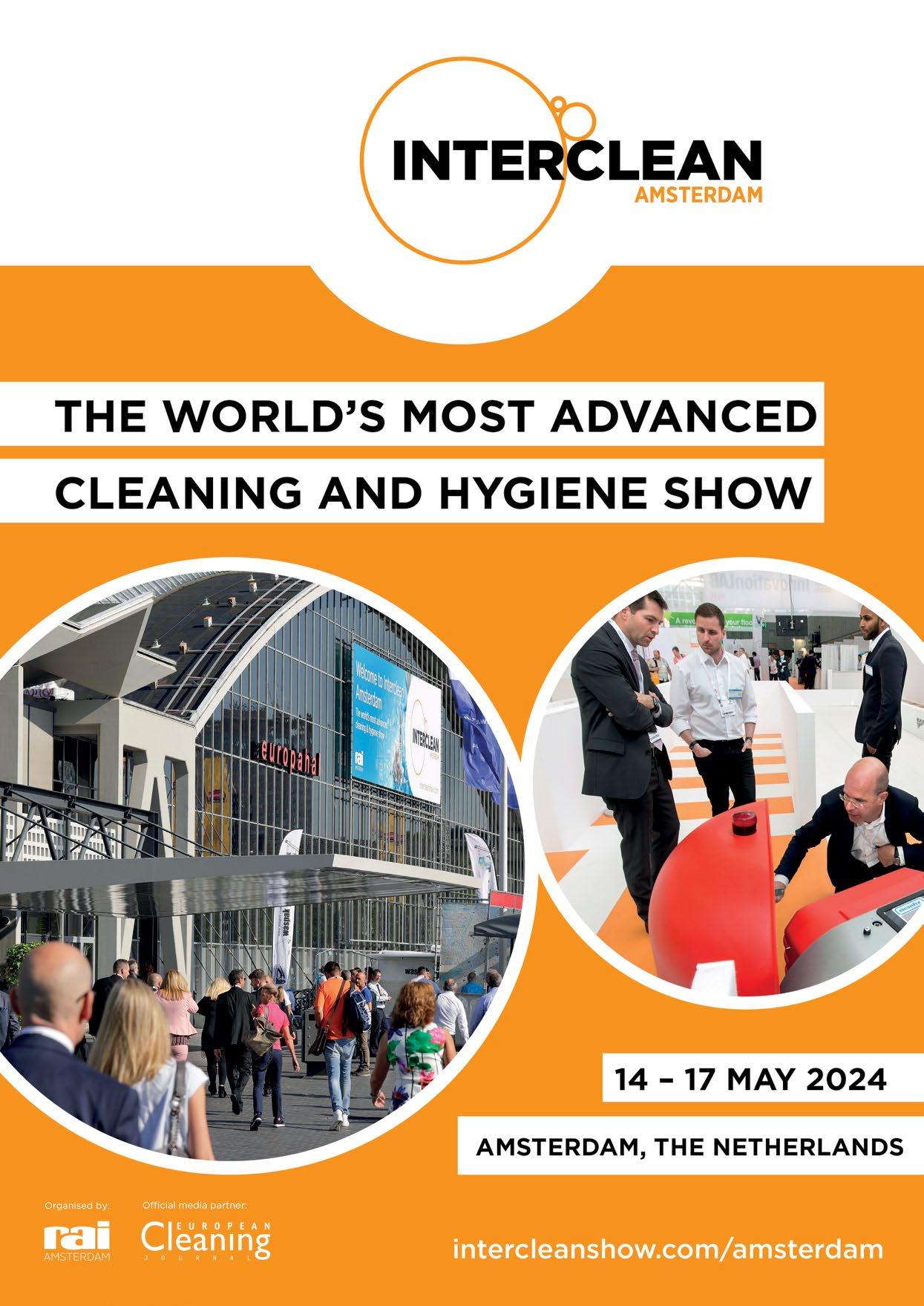
March/April 2024
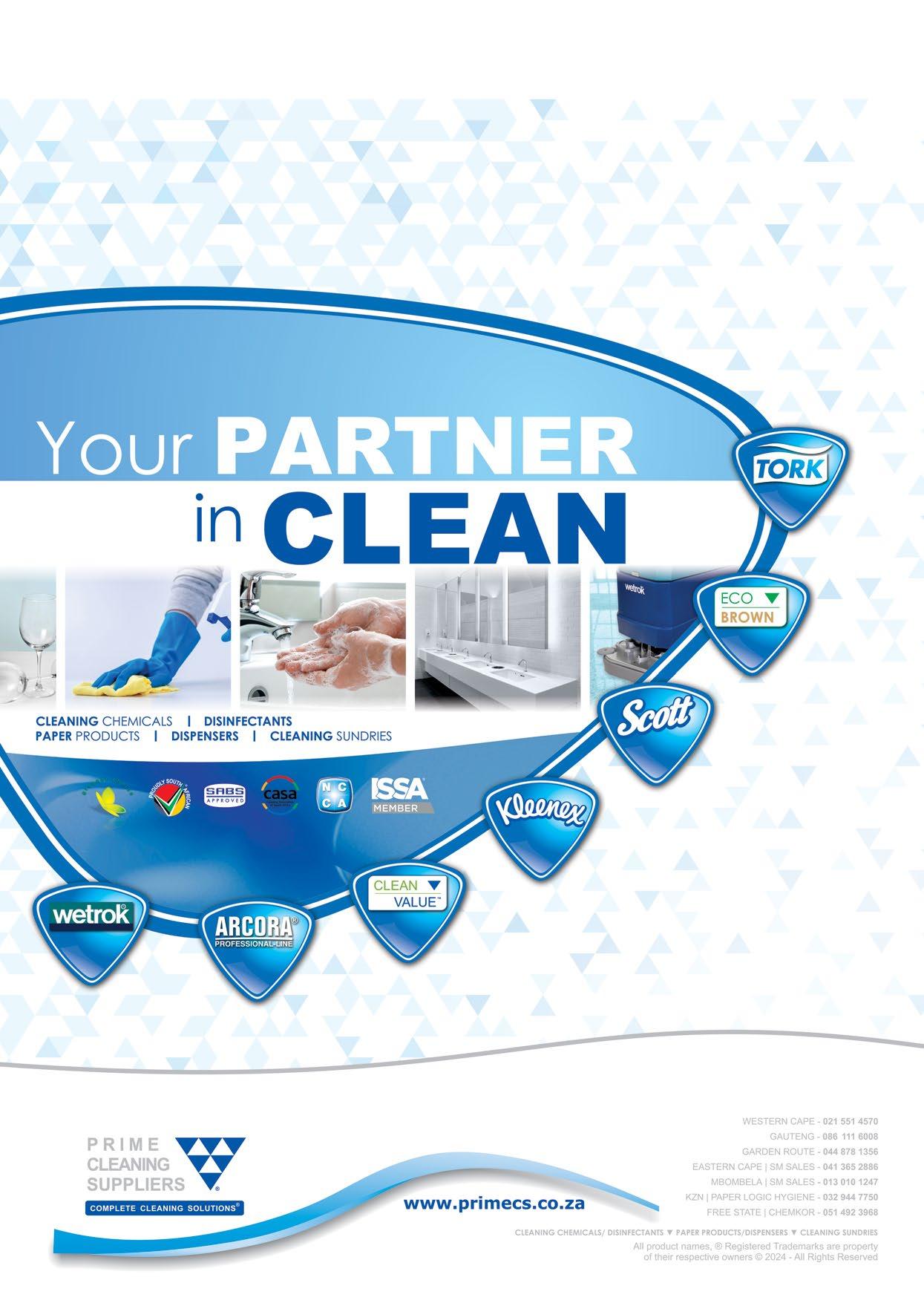
In this issue:
Digital and smart solutions
Lithium-ion battery fire suppression
Waste management
Recognise greenwashing
®
• Cleaning • Pest Control • Textile Care • Facility
Hygiene
Management Services
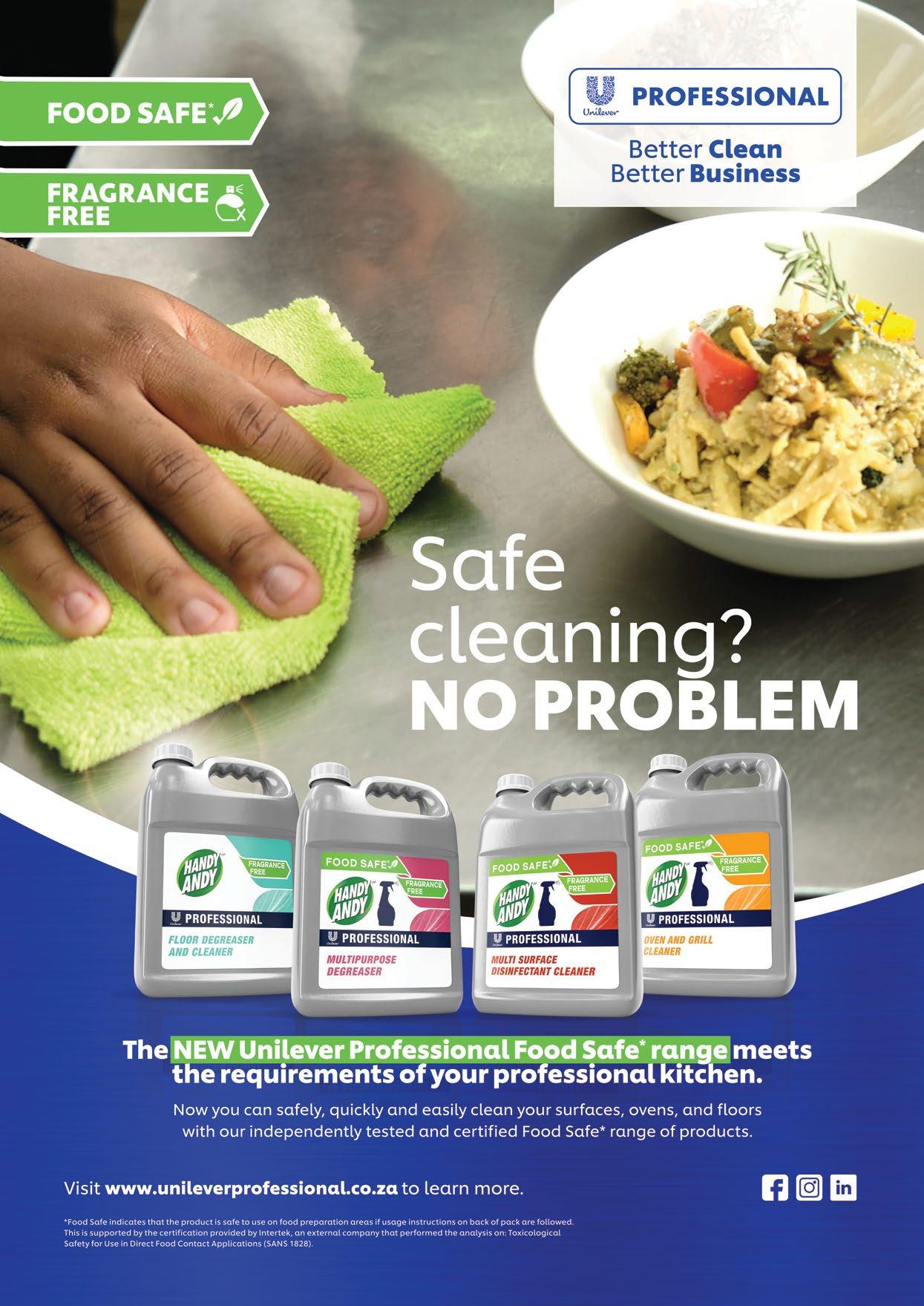

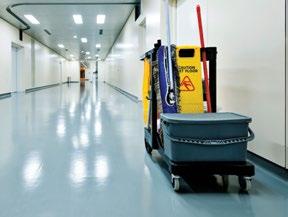
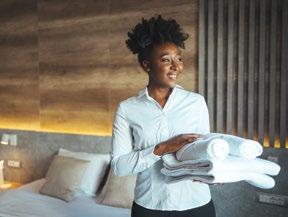


MARCH/APRIL 2024
VOL 25 NO. 2
Cover story
Prime Cleaning Suppliers is a leading South African cleaning-solutions supplier, established in 1996. Prime Cleaning Suppliers has spent a number of years building strong brands, many of which have been tested by the SABS 1828 and 1853 standards and carry their mark of surety, which gives the customer confidence when using the products. All disinfectants are registered as per Act 29 and are compliant with the VC8054 compulsory specification for disinfectants. Prime Cleaning Suppliers’ complete cleaning solutions cover paper products/dispensers, cleaning chemicals/ disinfectants, floorcare machines and cleaning sundries. Prime Cleaning Suppliers has an ongoing commitment to ensure the best long-term solution to their customers and represents the following brands: Aquarius, Kleenex, Scott, Tork, Wetrok, WypAll and Rubbermaid Commercial Products.
African Cleaning Review is aimed at end-users, contractors and suppliers of products and services to Africa’s Cleaning, Hygiene, Maintenance, Textile Care, Pest Control, Waste- and Facility Management Services industries. It is published every other month by: e-squared publications t/a e-squared Media
Tel: +27 (0) 11 238 7848 or +27 (0) 72 611 1959
PO Box 1976, Halfway House, 1685, South Africa
Email: africancleaningreview@cleantex.co.za
Website: www.africancleaningreview.co.za
@AfricanCleanMag AfricanCleaningReview african-cleaning-review
Publishing Editor: Johann van Vuuren
+27 (0) 11 238 7848 or +27 (0) 72 611 1959
Email: africancleaningreview@cleantex.co.za
Advertising: +27 (0) 11 238 7848 or +27 (0) 72 611 1959
Email: africancleaningreview@cleantex.co.za
Operations and Accounts: Nandé Jacobs
Email: africancleaningreview@cleantex.co.za
All editorial contributions can be sent to the editor who reserves the right to publish editorial based on the strength of its content. No articles or photographs may be reproduced, in whole or in part, without written permission from the publishers.
Although every effort is made to ensure the accuracy and reliability of material published in African Cleaning Review, e-squared Media and its agents can accept no responsibility for the veracity of the claims made by contributors, manufacturers or advertisers. Copyright of all material published in African Cleaning Review remains with e-squared Media and its agents.
•
•
•
•
•

Planned features for 2024
Feature sections in every issue:
• Textile care review
• Facilities management review
July/August issue: Editorial deadline 14 June
• Healthcare cleaning and hygiene
• Wipes and wiping solutions
September/October issue: Editorial deadline 16 August
• Sustainability in cleaning
• Washroom hygiene
• Cleantex Africa preview

Secure your company’s presence at Cleantex Africa 2024, the only dedicated exhibition in Sub-Saharan Africa for professional cleaning, hygiene and all related workplace cleanliness industries. This international event boasts a 29-year history and is supported and endorsed by all major industry associations. Book a prime position stand!
www.cleantex.co.za
Official publication and media partner of:





Published by:


1 March/April 2024 | www.africancleaningreview.co.za 17 Opinion 2
Professional cleaning and hygiene trends to look out for this year Industry News 4
•
National Minimum Wage increase – what
should know
you
Week-long event celebrates the global impact of the cleaning industry
Uniting the global cleaning and hygiene community under one roof
More solutions, more conversation, more insights at IFAT 2024
Healthcare Cleaning Forum offers extensive 2024 programme
Global Executive Summit to reunite world’s leading facility services executives • International event for women in cleaning Features Digital and smart solutions 10 • How technology is smartening up the washroom • Introducing cleaning connectivity Waste management 16 • The power of paper recycling • Artificial intelligence to combat food waste • What greenwashing is and how to recognise it Editorial • Numatic: Maintain cleanliness and hygiene without 13 compromising productivity • Unilever Professional: Professional kitchens need 20 cleaning products that are tough yet safe to use • Fidelity Cleaning Services: Put the customer and the 23 planet at the centre of everything you do when cleaning Educational 14 Lithium-ion battery suppression • Key concepts in lithium-ion battery principals FM Review 22 • Nurture a workplace environment that prioritises employee well-being Textile Care Review 24 • Workwear laundries: maximum clean with a low footprint • The power of a venturi-based laundry dosing system People and Events 26 • Numatic introduces next generation lithium power • CASA golf day held in Cape Town • Innovative products unveiled at exclusive showcase event New Products 28
Introducing the first 100% recycled, disposable microfibre wipe
•
•
•
Innovative toilet paper aims to tackle sewerage crisis contents
11
22
2
Joining the global cleaning community
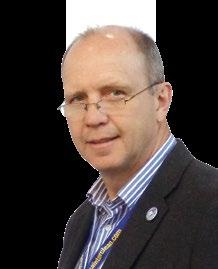
As many South Africans are making their final preparations to visit the biennial Interclean Amsterdam exhibition, either as part of the official group or independently, we are offering an extensive preview of what can be expected this year together with the high profile co-located executive events. Already regarded as the most trusted and respected international business networking platform for cleaning and hygiene professionals, this year’s show with more than 900 exhibitors will feature added events including the Healthcare Cleaning Forum and a global executive summit staged by the World Federation of Building Service Contractors (WFBSC). The three main themes of the exhibition are technology, innovation, and digitalisation; sustainable environment and ESG; and healthcare hygiene and disinfection. During the four show days, leading experts from around the world will conduct exclusive knowledge-sharing sessions. Healthcare environmental cleaning plays a pivotal role in reducing healthcare-associated infections. The Healthcare Cleaning Forum, a unique one-day international conference, will bring together healthcare experts, cleaning professionals, hospital managers, infection prevention specialists, facility managers and industry leaders to explore the latest trends and challenges shaping this vital sector.
Our two main features take a closer look at digital and smart solutions in this industry and waste management solutions. These features explore the growth of connectivity in cleaning, the crucial role of waste management solutions in modern society, and, in the age of misinformation, we explore the obvious signs of greenwashing. The People and Events section offers a wrap of what’s been happening in the industry over the past two months.
Enjoy the read.

Professional cleaning and hygiene trends to look out for this year
Get ready to witness a dazzling future where sparkling floors, shiny windows and sanitised surfaces are just the tip of the iceberg. This year has exciting factors in store for the cleaning and hygiene industry, with innovations that will set a new standard for clean, making hygiene more efficient and effective than ever before. These advancements promise to change the way we think about and achieve clean in various sectors.
From healthcare facilities battling invisible threats to bustling restaurants seeking germfree dining experiences, hygiene is entering an exciting new era of digitalisation, sustainability and human-focused innovation. The new Interclean report, The Future is Crystal Clean: 10 Innovations and Trends in Professional Cleaning and Hygiene for 2024 takes an in-depth look at cleaning trends in 2024.
1. VR and AR revolutionise training and work
Imagine cleaning crews wearing virtual reality headsets, tackling simulated biohazard spills and mastering complex cleaning protocols in immersive training programmes. Or envision augmented reality overlays guiding cleaners in real-time, highlighting hotspots and optimising routes. This is no longer science fiction – VR and AR are transforming training, enhancing skills and boosting efficiency in cleaning operations.
2. IoT sensors at the forefront of the 2024 hygiene revolution
Forget about guesswork and intuition. Imagine buildings with smart sensors that monitor air quality, track occupant movement, and even detect pathogens in real time. These data-driven guardians guide cleaning efforts, ensuring targeted hygiene is in place where it’s needed most – from high-traffic areas to germsensitive zones. This hyper-awareness revolutionises cleaning, shifting from reactive to proactive, and ensuring optimal hygiene every step of the way.
3.
Data-driven hygiene, digitalisation and AI transform professional cleaning
Big data isn’t just for Wall Street anymore. Cleaning companies are harnessing its power to analyse cleaning patterns, predict equipment failures and customise cleaning schedules based on real-time data. Imagine AI systems optimising resource allocation, suggesting the most effective cleaning methods, and even automatically deploying robot cleaners – all in real
from the editor 2 opinion
time. This is the future of data-driven hygiene, where meticulous analysis replaces guesswork and maximises efficiency.
4. Navigating data privacy concerns in AI-powered hygiene and cleaning
As data becomes the gold standard, concerns about privacy are bound to arise. This is where transparency and ethical practices take centre stage. Expect to see regulations, protocols and frameworks ensuring responsible data collection, usage and anonymisation – safeguarding individual privacy while harnessing the amazing power of data for a cleaner future.
5. Wearable tech innovations
Imagine wristbands monitoring cleaners’ well-being, guiding them through tasks and even tracking cleaning progress, or smart glasses displaying instructions and highlighting problem areas. Exoskeletons will reduce physical strain and improve ergonomics. Wearable tech can empower cleaning staff, optimising their workflows and ensuring ideal standards of hygiene and sanitisation.
6. Cost savings
Forget about tightening your budget just to maintain hygiene standards. Automation, data-driven efficiency and
reduced waste through green cleaning solutions are driving significant cost savings. Expect to see investments in innovation yielding impressive financial returns, without sacrificing desired standards of cleanliness and hygiene.
7. Smaller size design innovations offer impressive functionality
Size isn’t everything. Miniaturised robots are compact and nimble – able to conquer tight spaces and navigate intricate equipment, disinfecting areas that were previously inaccessible. This design revolution promises to expand the reach of hygiene efforts, leaving no nook or cranny unattended.
8. Innovative solutions for healthcare cleaning
Healthcare facilities face unique challenges, battling unseen threats and striving to protect vulnerable patients. Expect to see breakthroughs in UV-C disinfection robots, germ-killing fabrics for surfaces and even AI-powered sanitation protocols, all working together to create a safer, healthier environment for patients, staff and visitors alike.
9. Sustainability and ESG innovations take centre stage
The cleaning industry is going green! Biodegradable cleaning agents, recycled materials for tools and packaging,
and energy-efficient equipment are on the rise. Environmental, social and governance (ESG) principles are influencing procurement decisions, promoting ethical practices and encouraging responsible sourcing within the industry. This eco-conscious revolution promises not only a cleaner planet but also a more accountable and sustainable cleaning industry.
10. Attracting and retaining staff
Innovation doesn’t replace the human touch. Cleaners are the heroes of hygiene and retaining their expertise is critical. Expect to see initiatives like training programmes for using new technologies, competitive wages and benefits and opportunities for career advancement to attract and retain top talent. This recruitment revolution recognises the vital role of cleaners in creating a sparkling future.
From 14 to 17 May this year, cleaning professionals will have an opportunity to discover and explore these amazing innovations in action at Interclean Amsterdam, the largest professional cleaning trade show in the world. For a deeper understanding of the issues touched on in this article download The Future is Crystal Clean: 10 Innovations and Trends in Professional Cleaning for 2024 here: https://www.intercleanshow.com/ reports/the-future-is-crystal-clean-professionalcleaning-trends-2024
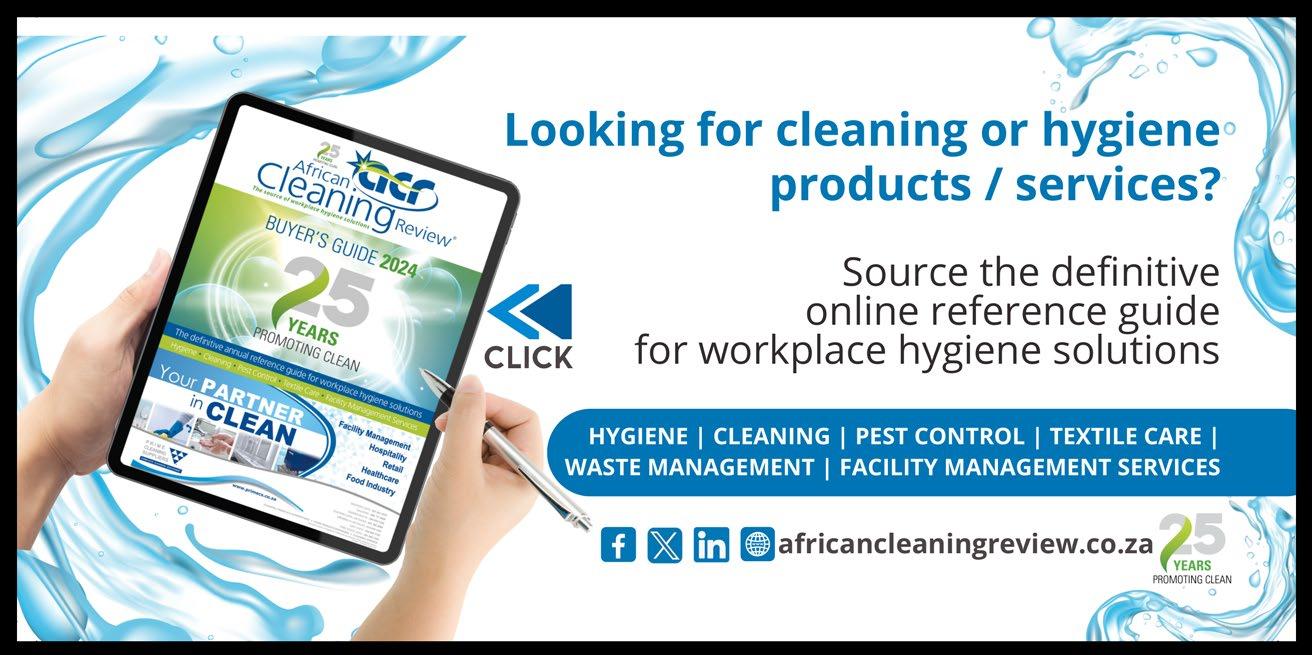
3 March/April 2024 | www.africancleaningreview.co.za
opinion
National Minimum Wage increase – what you should know
Employment and Labour Minister, Thulas Nxesi announced that the National Minimum Wage (NMW) for each ordinary hour worked will increase from R25.42 to R27.58. The National Minimum Wage Act was first proclaimed in 2018, setting a historic precedent in the protection of lowearning (vulnerable) workers in South Africa and providing a platform for reducing inequality and huge disparities in income in the national labour market.
The NMW was first implemented on 1 January 2019 at a level of R20 per hour.
Area A
Metropolitan Councils: City of Cape Town, Greater East Rand Metro, City of Johannesburg, Tshwane and Nelson Mandela
Local Councils: Emfuleni, Merafong, Mogale City, Metsimaholo, Randfontein, Stellenbosch, Westonaria
The increase was based on the recommendation of the NMW Commission, which considered various factors such as inflation, the cost of living, wage levels, productivity and the like. The Minister adopted the view of eight of the 12 Commissioners, who proposed an increase of CPI plus 3 percent, based on the CPI of 5.5 percent in November 2023.
Cosatu said the increase would provide relief to more than six million workers earning within the national minimum wage range.
Area
All areas in KwaZulu-Natal NB: Conditions of employment for KwaZulu-Natal areas shall be subject to the agreement concluded in the Bargaining Council for the Contract Cleaning Service Industry KwaZulu-Natal (BCCCI)
Workers in the agricultural, domestic, construction, retail, hospitality, transport, security and cleaning sectors would benefit the most according to the Trade Union Federation.
In terms of the law, it is an unfair labour practice for an employer to unilaterally alter hours of work or other conditions of employment in implementing the NMW. With effect from 1 March 2024, employers shall pay contract cleaning workers at least the minimum hourly wage as detailed in the schedule below:
In the rest of South Africa
Employment law service, Labourwise, reminds employers that the National Minimum Wage excludes allowances that are paid to enable employees to work (such as transport and equipment), or payment in kind (such as board or accommodation), as well as bonuses, tips or food.
For more information on the NMW, visit: www.ncca.co.za
Week-long event celebrates the global impact of the cleaning industry
International Cleaning Week took place from 24 to 30 March 2024.
The week-long event, hosted by ISSA, the worldwide cleaning industry association, is a global celebration to honour frontline cleaning professionals and advocates for the industry.
For four consecutive years, ISSA has hosted National Cleaning Week at the end of March. Based on the event’s tremendous success in the United States, this year, ISSA expanded the reach of this weeklong public acknowledgement of the industry’s positive impact on the economy as well as the value of clean as it relates to improving public health.
“ISSA is thrilled to build on the success of National Cleaning Week by hosting the first International Cleaning Week,” says ISSA Executive Director John Barrett. “This expanded scope reflects the value of clean and importance of cleaning for health worldwide, as well as ISSA’s international reach.”
International Cleaning Week represents a unique opportunity to celebrate the value of clean, raise public awareness and honour your peers. Supporting cleaning industry companies and organisations can partner with ISSA to further spread public awareness. International Cleaning Week provides a unique
opportunity for companies in the cleaning industry to connect with their clients, show appreciation for their teams and highlight the importance of clean environments.
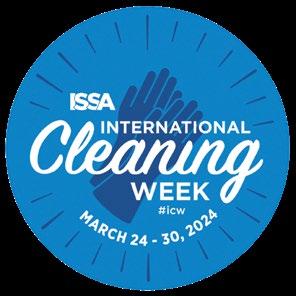
4 www.africancleaningreview.co.za | March/April 2024 industry news
B Area C
Rate per hour R30,35 Rate per hour R29,12 Rate per hour R27,67
Uniting the global cleaning and hygiene community under one roof
The world’s largest international platform for professionals in the world of cleaning and hygiene, Interclean Amsterdam, will take place from 14 to 17 May 2024 at the RAI Amsterdam Exhibition Centre.
Featuring top international exhibitors, exciting onsite demonstrations, the latest innovations from around the globe and superb networking and entertainment opportunities – this unmissable line-up promises to be bigger, better and bolder than ever before!
Renowned across the globe for being the most trusted and respected international business networking platform for the cleaning and hygiene industry, Interclean Amsterdam has gone from strength to strength since it was first founded in 1967.
“This year, Interclean is pulling out all the stops. Our team has been working non-stop behind the scenes to organise a truly world-class and completely unique event. It promises to be highly informative, inspirational and entertaining. We’ve worked hard to bring our visitors exclusive content about the world’s most cutting-edge technologies, trends and solutions – all geared towards helping you to
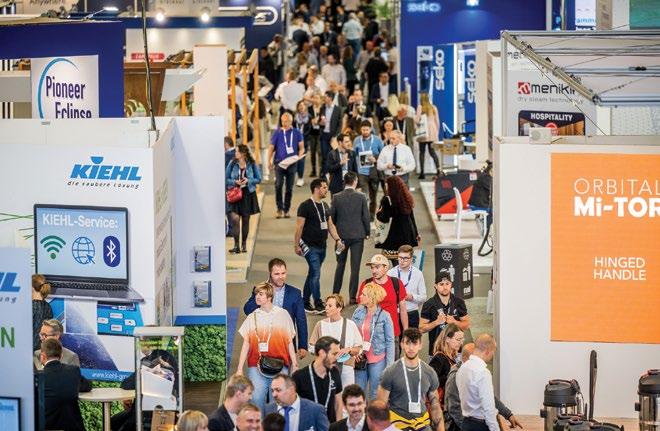
discover the best products, services and connections to achieve your unique business goals,” says Robert Stelling, Director of Interclean Global Events.
The main themes of this year’s exhibition featuring more than 900 exhibitors include:
• Technology, innovation and digitalisation
• Sustainability, environment and ESG
• Healthcare, hygiene and disinfection
The world’s leading experts on cleaning and hygiene within the food service, office real estate, hospitality and healthcare sectors will conduct exclusive knowledge-sharing sessions,
revealing the most up-to-date research, findings and predictions. To add lustre and liveliness to the line-up, the organisers have arranged superb leisure opportunities including live music, celebrity line-ups, DJs, comedians and other amazing entertainment. During the Interclean Social Club and VIP Networking Sessions, visitors will have an opportunity to enjoy the electrifying atmosphere while discovering the future of cleaning and hygiene.
Don’t be left out! Secure your spot at the world’s No. 1 cleaning and hygiene show now by registering as a visitor at https://www. intercleanshow.com/amsterdam/register
More solutions, more conversation, more insights at IFAT 2024
IFAT Munich, taking place in the Munich exhibition halls from 13 to 17 May 2024, will feature topclass speakers, more international exhibitors and a varied and exciting event programme. At the world’s leading trade fair for water, sewage, waste and raw materials management, visitors can expect innovative environmental technologies, flanked by panel discussions, expert lectures and live demonstrations.
“More than ever, IFAT Munich is seen as the central solution
platform and knowledge hub for all aspects of the circular economy,” says Stefan Rummel, CEO of Messe München GmbH. “In addition to the many national and international experts, we also welcome many high-ranking politicians to IFAT Munich who are looking to interact with the industry.”
Heavy rain and flooding, extreme heat and water shortages – the consequences of climate change – cannot be ignored. This results in growing pressure
on all social players, such as politicians, companies and private individuals, to adapt to the changed conditions. Municipalities play a special role on the path to more climate resilience. IFAT Munich is devoting the ‘Day of Resilient Municipalities’, taking place on Thursday 16 May, to this key role. In collaboration with the German Technical and Scientific Association for Gas and Water (DVGW), the German Association for Water Management (DWA), and the Association of Municipal
5 March/April 2024 | www.africancleaningreview.co.za
industry news continues >>

The last day of the trade fair, Friday 17 May, will focus on the key question of how and under
what conditions we will live in the future. What role have cities played so far, and what role will they play in the future? What makes cities worth living in, and how should we plan them to ensure that they are prepared for social and climate challenges? The panel discussion
‘Future of Living – Adapting to the results of climate change’ will offer valuable suggestions for these considerations. IFAT Munich has been able to attract two internationally sought-after guests for the panel discussion: star architect, Daniel Libeskind, whose narrative design language is particularly influential in cultural institutions worldwide, and Ian Goldin, Professor of Globalisation and Development at Oxford University and founding director of the world-leading Oxford Martin School research group.
In addition to the varied supporting programme, IFAT Munich 2024 will once again offer exciting live demonstrations, practical days and the Truck in Action Show. A detailed overview is now available on the IFAT website at www.ifat.de/en
Healthcare Cleaning Forum offers extensive 2024 programme
Interclean’s Healthcare Cleaning Forum (HCF) will open its doors for the third time in RAI Amsterdam on 16 May 2024. This unique one-day international conference is dedicated to advancing the crucial field of healthcare environmental hygiene and focuses on the intersection of environmental cleaning, disinfection, patient safety and infection prevention and control.
Environmental cleaning and disinfection play pivotal roles in reducing healthcare-associated infections. Partly due to the pandemic, the awareness of the importance is growing. Examples are the growing number of scientific publications and the innovative technologies entering the market. Therefore, the momentum is now! The HCF brings together healthcare experts, cleaning professionals, hospital managers, infection prevention specialists, facility managers and industry leaders to explore the latest trends and challenges shaping this vital sector.
Delegates to the event can look forward to an extensive programme

featuring breakout sessions and keynote speakers including Prof. Didier Pittet (University of Geneva Hospitals, Switzerland), Martin Kiernan (Richard Wells Research Centre, United Kingdom), Edmée Bowles (Radboudumc, the Netherlands), and Brett Mitchell (Avondale University, Australia).
The HCF offers in-depth insights into trends and challenges that affect environmental cleaning and hygiene in the healthcare sector in hospitals and long-term-care institutions. HCF raises awareness, facilitates discussions of
best practices and explores the latest scientific research on how cleaning can have an impact on infection prevention and control.
The HCF serves as a dynamic platform, is developed in close cooperation with CleanHospitals ® and is powered by Interclean Amsterdam, the largest professional cleaning trade show in the world.
Tickets can be ordered now through the Healthcare Cleaning Forum website at www. intercleanshow.com/healthcare-cleaning-forum
6 www.africancleaningreview.co.za | March/April 2024
industry news
Enterprises (VKU), lectures, expert panels and guided tours providing valuable stimulus will be offered for all representatives of the municipal sector.
South African delegates at the 2022 Healthcare Cleaning Forum in Amsterdam
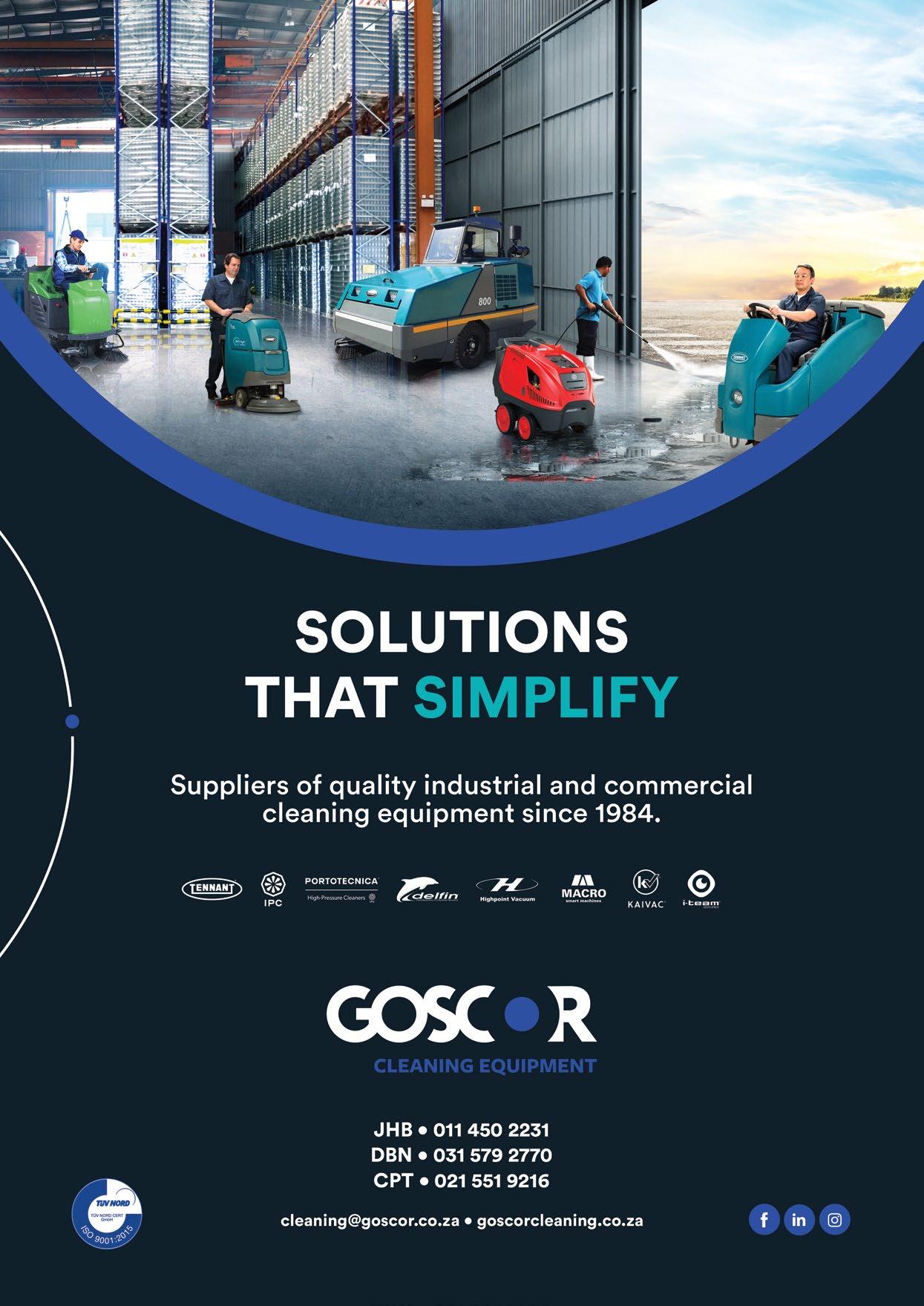
Global Executive Summit to reunite world’s
leading facility services executives

The World Federation of Building Service Contractors’ 2024 Global Executive Summit (GES) is set to take place in Amsterdam from 14 to 15 May 2024, in collaboration with the Interclean Amsterdam exhibition.
Tailored exclusively for CEOs, COOs, owners and senior leadership within contract cleaning and facility services firms, the GES promises valuable insights, trend analysis, networking opportunities and access to cutting-edge technology showcased at the Interclean Trade Show.
“The 2024 summit is crafted to address the specific needs of executive leaders in global contract cleaning firms,” remarks Stan Doobin, CBSE, WFBSC president and CEO and owner
of Harvard Maintenance. “WFBSC is uniquely positioned to enhance the experience for contract-cleaning executives attending the show, offering education tailored specifically to our industry.”
The WFBSC Global Executive Summit features a comprehensive two-day format, featuring sessions on executive leadership, sustainability, labour challenges and opportunities and technology trends for the commercial cleaning industry. The programme will feature a mix of lectures, case studies and panel discussions. The two half-day format aims to maximise attendee engagement with WFBSC programming and encourage interaction with exhibitors at the Interclean show.
International event for women in cleaning
Diversity has become an increasingly important topic in various industries, and the cleaning industry is no exception. Therefore, a group of dedicated women are organising an international event for women on 15 May, at the Interclean Amsterdam exhibition.
“By promoting diversity within companies, we not only attract and retain top talent, but also increase business success. This aligns with the United Nations’ sustainability goals, making it crucial for companies to embrace diversity”, says Martine Mallee, organiser of the Female Leaders in Cleaning event.
“In addition to promoting diversity, we also want to challenge companies to take responsibility for their social impact,” adds event committee member Helge Alt. “By having someone dedicated to addressing issues related to diversity and inclusivity in the workplace, we can make a significant difference.”
To gain insight and inspiration on this topic, women can attend the Female Leaders in Cleaning event. Female leaders will take the stage to empower and inspire other women in the industry. Talks will focus on female leadership and the unique challenges faced by women in the cleaning industry. The event aims
The WFBSC Global Executive Summit provides a platform for attendees to engage in one-on-one discussions, exchange ideas and share knowledge with their international counterparts. Chris Mundschenk, CAE, executive director of WFBSC, explains further: “The Board of Directors is excited to build on our strong legacy of connecting this influential group of global executives at a critical time for the industry.”
“Interclean offers the ideal environment to bring together facility management executives, and the WFBSC Global Executive Summit serves as an ideal platform for executives to exchange best practices, explore industry trends and better understand the evolving needs of customers.”
The WFBSC is a trade association representing the leading contractcleaning companies and regional associations serving the building services industry. Contractors, manufacturers and service providers supporting the global cleaning industry rely on WFBSC for education, networking, training and research.
For more information, visit: www.wfbsc.org

to not only inspire but also foster a sense of solidarity among women. It will be an opportunity to share experiences and learn from one another.
For more information, visit: www.femaleleadersincleaning.com
8 www.africancleaningreview.co.za | March/April 2024
industry news
Photo by Massimo Virgilio on Unsplash


Firstly, it should be clean, hygienic and well stocked with essential soap and paper supplies. Washrooms should also be easy to locate when needed and should be accessible to everyone of all ages and abilities. As the issue of sustainability climbs up the global agenda, it is also becoming more important that washrooms should be designed to minimise waste and water use.
Public washrooms should ideally be aesthetically pleasing places where people feel sufficiently comfortable to take time out and practice good hand hygiene. So, if accessibility, sustainability, hygiene and aesthetics are all key prerequisites of a washroom, where does technology fit into the list of requirements?
It turns out that technology can help with all the above factors –and with others. Smart solutions are helping to drive up standards, enhance the user experience, speed up queues, make the cleaner’s life easier and even monitor people’s health.
Following the launch of the smartphone in 2007, there has been a growing trend for people to photograph everything around them, even in the toilet. As a result, people are increasingly taking pictures of public washrooms and uploading them onto social media.
How technology is smartening up the washroom
Why do we need sensors, connectivity and digital systems in the washroom? In this article, Tom Marshall, from Tork manufacturer Essity, examines the positive role that technology can play in the washroom. Any washroom that has been designed for use by the public needs to meet a few basic requirements.
Facilities that are either particularly attractive or strikingly unpleasant tend to polarise much of this attention and a growing number of ‘World’s Best Washrooms’ lists have appeared on the internet.
This trend of photographing everything has given venues an enhanced interest in sprucing up the toilet facilities in the hope that they will be included on ‘best washrooms’ websites. At the same time, unsavoury
seat of the Wellness Toilet record the user’s pulse and blood pressure and analyse their waste via technology embedded in the bowl.
At the same time, many companies have been adopting less headlinegrabbing technology in a bid to enhance washroom hygiene while also making life easier for visitors and cleaners.
For example, many large washrooms now deploy ‘smiley’ feedback panels allowing visitors to rate their washroom
Smart dispensers are increasingly helping to ensure that washroom soap and paper supplies never need to run out. Sensors incorporated into washroom dispensers allow cleaners to check remotely on supplies of soap, toilet paper and hand towels.
facilities are increasingly being named and shamed on sites that call out venues on their dirty or unhygienic washrooms.
Meanwhile, a growing number of ‘toilet finder’ apps are being launched worldwide with the aim of helping people find an accessible washroom when they need one.
Technology is also being used in the toilet to monitor the user’s health. Japanese company, Toto, has developed a loo that uses artificial intelligence to analyse human waste. Sensors in the
experience by pressing a red, amber or green button. Such systems provide valuable data for washroom managers and enable them to respond immediately to any poor feedback or hygiene issues.
Traffic light systems that light up green when a cubicle is empty and then turn red when it is engaged help to speed up queues. These work particularly well in busy airports and rail stations because they make it easier for visitors to pinpoint those cubicles that are available for use.
10 www.africancleaningreview.co.za | March/April 2024 feature digital and smart solutions
Smart dispensers are increasingly helping to ensure that washroom soap and paper supplies never need to run out. Sensors incorporated into washroom dispensers allow cleaners to check remotely on supplies of soap, toilet paper and hand towels. This removes the need for staff to make multiple journeys to physically check on dispenser status, saving time and freeing up resources.
Essity’s own Tork Vision Cleaning allows cleaners to monitor dispensers via a smartphone or tablet, for example, while peoplecounters allow a facility to build up a profile of washroom visits. The office manager can use this data to identify those toilets that are attracting the highest levels of traffic. The cleaner’s walking routes can then be streamlined accordingly, saving time and labour costs.
Meanwhile, technology is proving valuable around the world, Africa included, in environments where water is scarce and where sewage systems are expensive to install. For example, Johannesburg’s Soweto township now has flushing toilets that operate on a closed-loop system.
The flushed waste is sent into a collection tank from where it is drawn through a series of membranes. Here the solids are separated from the liquids and the bacteria is eliminated without the use of chemicals. These facilities are said to be more sustainable than the previous chemical toilets because they are solar-powered, and the water is purified with ozone which means it can be used indefinitely for flushing.
While technology may arguably not be strictly necessary in the toilet, it is proving its worth on many fronts. It is helping to enhance hygiene, drive up standards, monitor health and improve sustainable outcomes.
The Tork brand offers professional hygiene products and services to customers ranging from restaurants and healthcare facilities to offices, schools and industries. Products include dispensers, paper towels, toilet tissue, soap, napkins and industrial and kitchen wipers. For more information, visit: www.tork.co.za
digital and smart solutions
Introducing cleaning and connectivity
In the bustling world of cleaning services, efficiency is the name of the game. Yet, for far too long, the industry has grappled with a huge challenge: the management of staff. Historically, this task has relied on manual processes that involve managers putting pen to paper, resulting in inaccurate timesheets and attendance records. The inability to track task completion and the struggle to reach cleaning staff in various locations due to limited data, airtime or lack of mobile devices have compounded this issue. The result – a frustrating and unproductive ordeal that has taken a toll on businesses, both financially and operationally.

These inefficiencies have cost businesses significantly, not just in terms of the bottom line but also in the loss of effective working practices. Additionally, the burden of excessive data and phone costs have strained business owners and managers, who understand the critical need to stay in touch with cleaning staff for effective control measures.
However, there is a solution. According to MyMobile, it’s time to embrace digitisation and bid farewell
to the era of pen and paper. MyMobile implemented a simple software solution that can be customised to streamline cleaning-business operations. This simple yet powerful tool empowers you to monitor staff activities through customisable task lists, ensuring nothing falls through the cracks. Say goodbye to those error-prone timesheets and attendance records; the intuitive check-in system captures accurate data effortlessly.
11 March/April 2024 | www.africancleaningreview.co.za
feature
feature digital and smart solutions
Say goodbye to those error-prone timesheets and attendance records; the intuitive check-in system captures accurate data effortlessly.
Whether your company consists of one employee or one thousand employees, the dire need for management control is met. Leveraging this opportunity, companies can manage their cleaning staff in a manner that not only boosts productivity but also adds substantial value to business operations.
Now, let’s address the elephant in the room: connectivity. What good is a cutting-edge software solution if staff lack access to mobile devices or suffer from data and airtime constraints? This is where MyMobile’s innovative employee value proposition comes into play. By providing cleaning staff with low-cost cell phones bundled with data and airtime packages that are priced significantly below retail rates, the benefits are twofold.
First and foremost, staff members are equipped with the tools they need to excel in their roles. This not only enhances employee retention but also fosters a sense of empowerment and engagement among the team. Secondly, from a business perspective, data costs are reined in while gaining greater control over operations.
In the ever-evolving landscape of the cleaning services industry, the time has arrived to embrace the future of cleaning management, by bidding farewell to the inefficiencies of the past and stepping into in a new era of productivity through connectivity.
For more information, contact: arianna@mymobileza.com

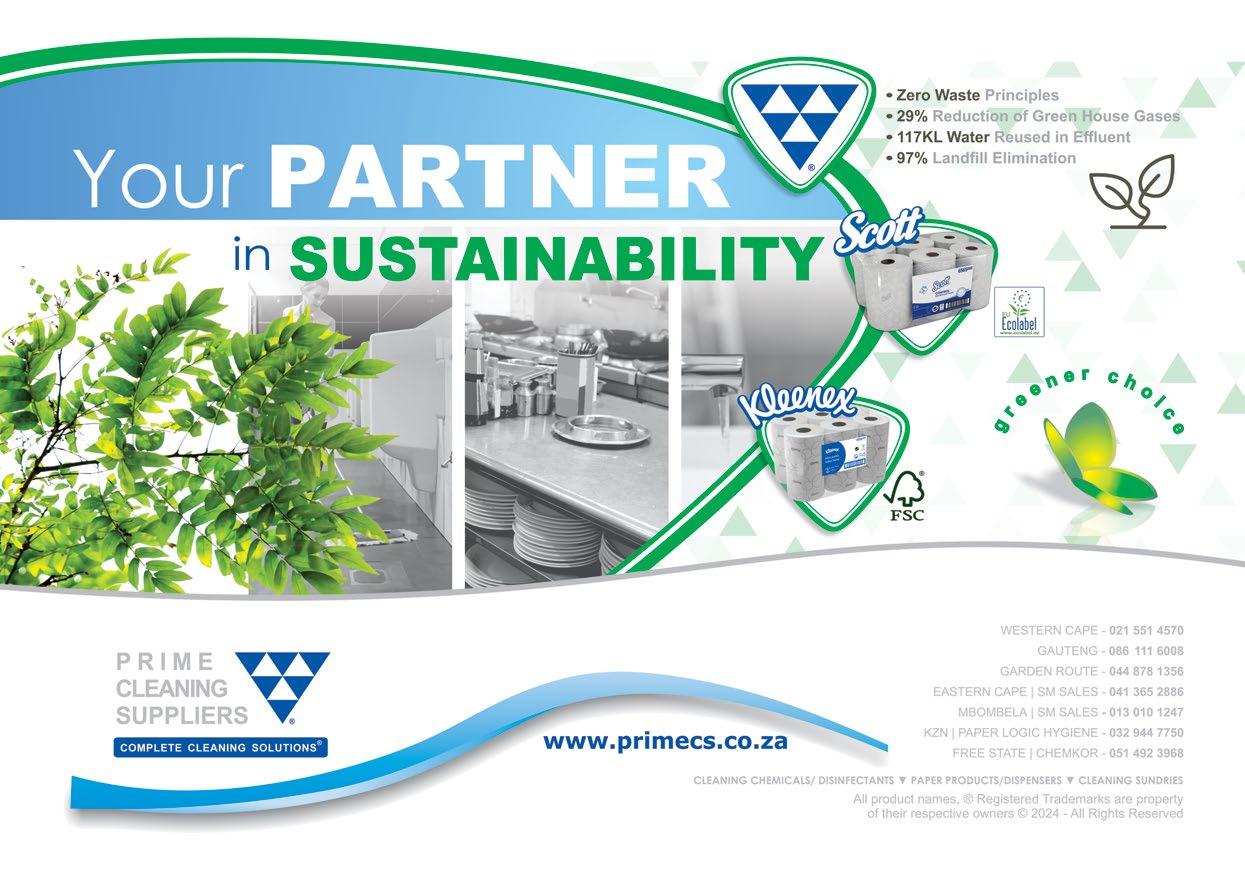
Maintain cleanliness and hygiene without compromising productivity
Numatic, a trusted name in the commercial cleaning equipment industry, has taken a significant step forward with their groundbreaking NX1K battery range. With its configurable performance, fast charging capabilities and sustainable design, the NX1K range is revolutionising the way we approach commercial cleaning.
One of the standout features of the NX1K range is its ability to run longer, offering increased runtime of up to 44 percent. This means that cleaning professionals can work for longer periods without interruption, ensuring that cleaning tasks can be completed when it is most convenient. Whether it’s a large commercial facility or a small office space, the NX1K range allows businesses to maintain cleanliness and hygiene without compromising on productivity.
Moreover, the NX1K range charges faster, providing complete flexibility in charging options. Unlike lead alternatives, which often have limited charging capabilities, the NX1K range unlocks the cleaning potential across the fleet, increasing available uptime. This not only improves efficiency but also ensures that businesses can meet the demands of their cleaning schedules without any unnecessary delays.
Sustainability is a pressing concern in today’s world and the NX1K range addresses this issue head-on. By lasting longer than lead alternatives, the NX1K range significantly reduces material use and
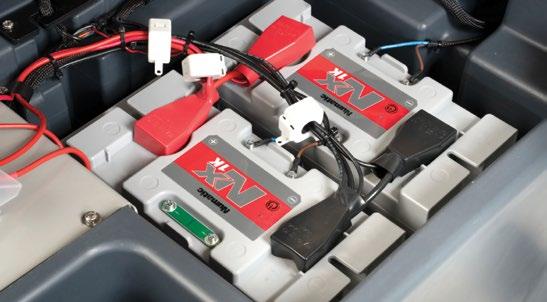
disposal, making it a much more sustainable solution. This not only minimises the environmental impact but also reduces the costs associated with frequent battery replacements.
The NX1K range utilises the latest Lithium Phosphate Technology, ensuring extended long-life power. With over 4,000 charge cycles, the NX1K range is one of the safest battery platforms on the market. Numatic’s dedication to quality and safety is further exemplified by the 5-year battery warranty provided as standard, with an extended 8-year battery warranty option available.
For more information, visit: www.numatic.co.za
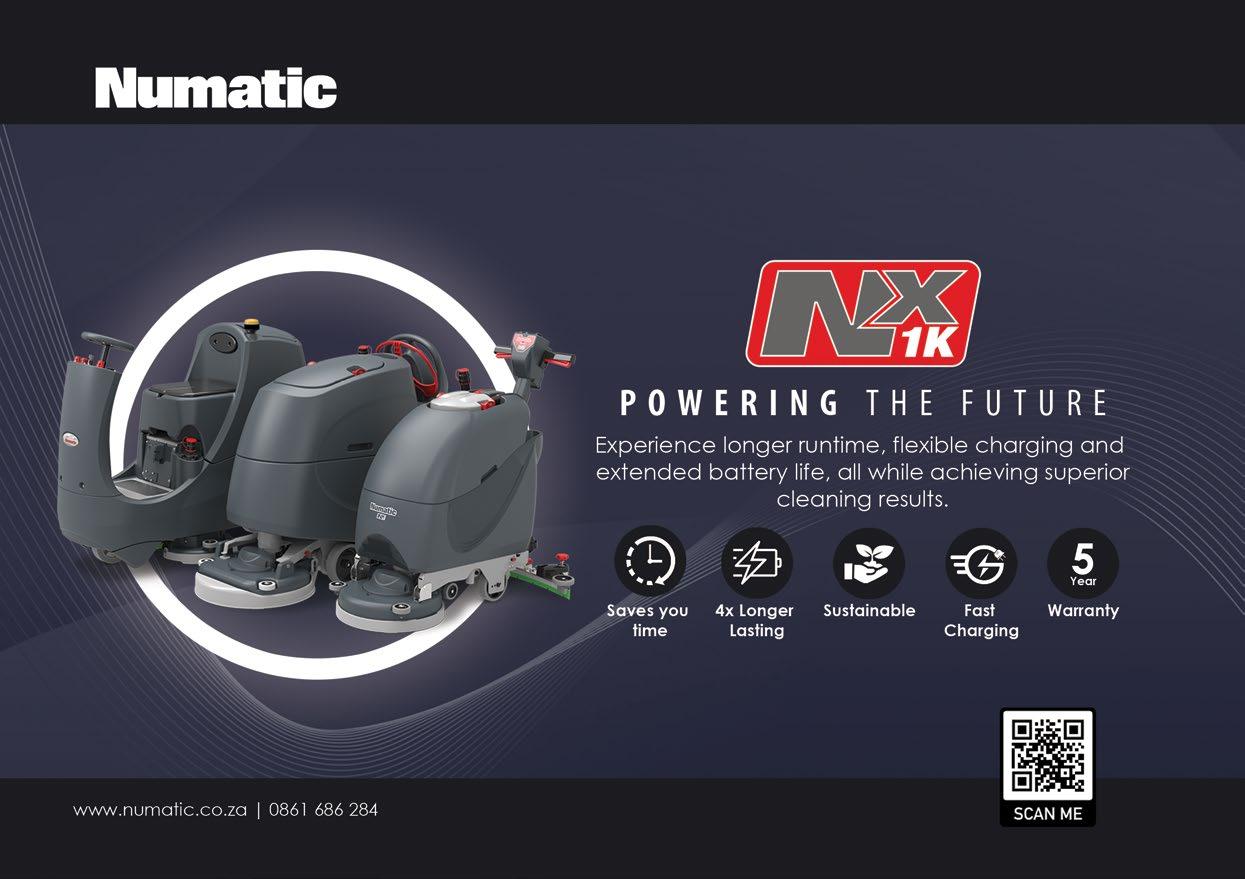
editorial Numatic
Key concepts in lithium-ion battery principles
Whether you’re a tech enthusiast, a user of the latest cleaning equipment or someone keen on the future of energy storage, understanding key concepts relating to lithium-ion batteries is invaluable. SafeQuip, a leading distributor of firerelated equipment, sheds more light on the common terms associated with these powerful energy sources and prepares users for any lithium-ion battery fire emergency.

Lithium-ion battery
A lithium-ion battery is a rechargeable battery known for its high energy density, making it lightweight and capable of storing a substantial amount of energy. It features the following few key parts:
Cathode: This is the positive electrode. It’s made of special materials that store lithium-ions.
Anode: This is the negative electrode and is usually made of a carbon-based substance, like graphite.
Electrolyte: This is best described as the battery’s bloodstream. It’s a liquid or gel that assists lithium-ions to move between the cathode and anode. It’s important to note that this liquid or gel is flammable.
Separator: Think of this as the battery’s security guard. It keeps the cathode and anode apart to prevent short circuits. It also allows the movement of ions, which generates the electrical potential but blocks the electrons.
Current collectors: These are like the wires in the battery, helping the electricity flow in and out.
State of charge: This indicates the percentage at which the battery is charged. The higher the charge, the bigger the potential for fire risk.
Battery management system (BMS)
A BMS is an electronic system that monitors and manages various aspects of a lithium-ion battery’s performance and safety. It is crucial in protecting batteries from over-charging, over-discharging and other potentially harmful conditions. BMS is commonly used in electric vehicles and renewable energy storage systems.
Cycle life
Cycle life refers to the number of charge and discharge cycles a lithiumion battery can undergo before its capacity and performance start to degrade significantly. It is essential to consider cycle life when evaluating a battery’s long-term durability and costeffectiveness, particularly in applications with frequent charging and discharging.
Thermal runaway
One of the most significant concerns associated with lithium-ion batteries is a phenomenon known as thermal runaway. Thermal runaway occurs when a lithium-ion cell enters a state of uncontrollable self-heating. This situation can lead to exceptionally high temperatures, the forceful release of gases from the cell and the potential for smoke and fire to erupt. If a cell goes into a thermal runaway, it runs
the risk of setting the other cells into a thermal runaway.
Aqueous vermiculite dispersion (AVD)
AVD is a fire-suppression technology used in lithium-ion battery fire extinguishers. It consists of a waterbased solution containing vermiculite, a naturally occurring mineral. AVD is designed to rapidly cool and suppress lithium-ion battery fires, making it an effective tool for mitigating fire hazards associated with batteries.
Fire suppression
Fire suppression refers to the techniques and technologies used to control and extinguish fires. In the context of lithium-ion batteries, Lith-Ex Fire Extinguishers are designed to provide peace of mind. Compact and powerful, Lith-Ex Fire Extinguishers are a must-have for every space. With this state-of-the-art technology, you can be confident that you’re prepared for any lithium-ion battery fire emergency.
SafeQuip remains dedicated to elevating fire safety standards in South Africa and worldwide, ensuring the effective mitigation of lithium-ion battery fire risks. For more information about the company and its products, visit: www.safequip.co.za
14 www.africancleaningreview.co.za | March/April 2024 educational lithium-ion battery fire suppression
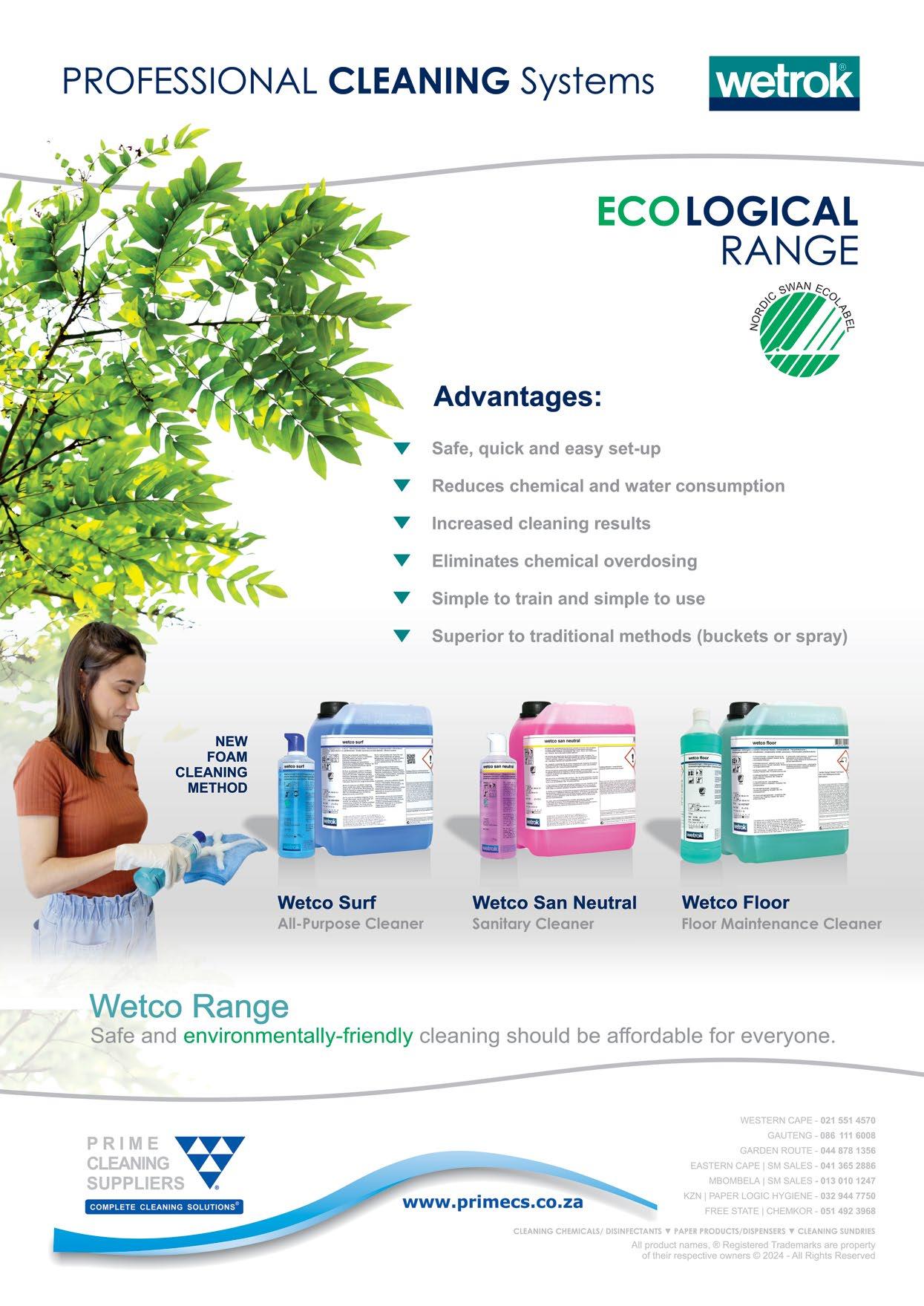
waste management
The power of paper recycling
Let’s focus our attention on something often overlooked but incredibly important: paper. It may seem like a small act, but recycling paper can yield substantial benefits for our environment and our future. Therefore, let’s make a commitment to paper recycling and explore the many advantages it brings, says Interwaste’s Natasha Edwards.
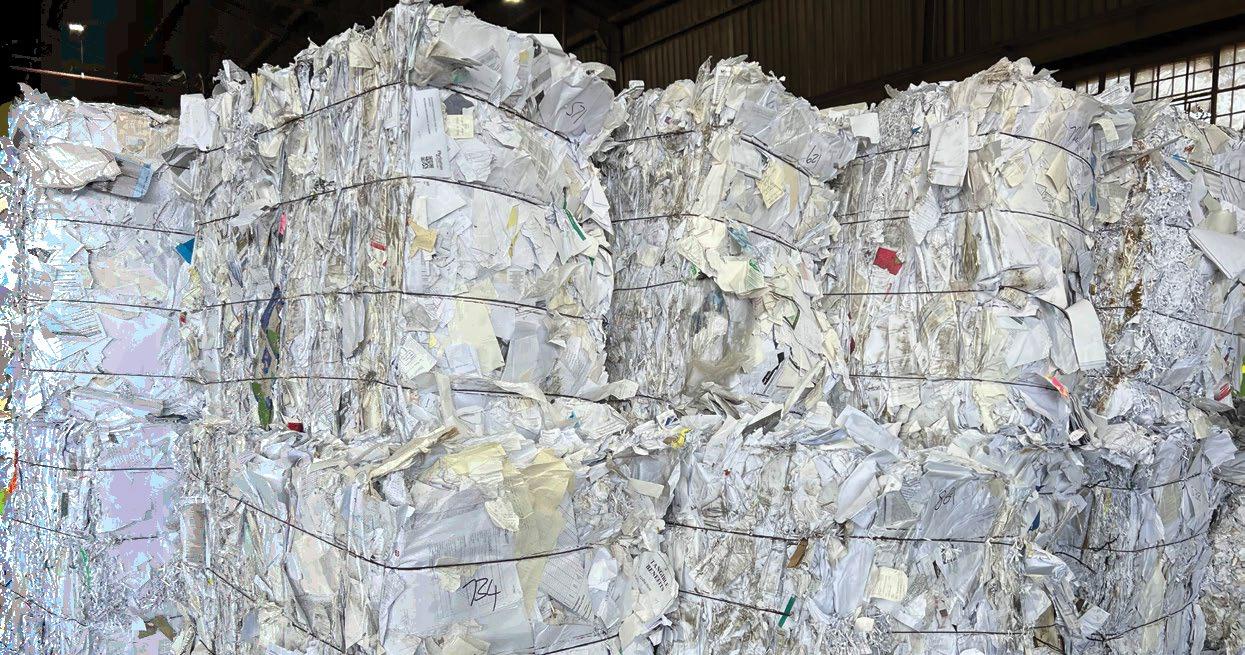
The hidden impact of recycling paper Recycling paper is not just about decluttering your workspace or feeling virtuous about saving a few trees. It’s a powerful environmental action that conserves energy and water, reduces greenhouse gas emissions and enhances air quality. From a seemingly simple act comes a multitude of advantages.
Paper recycling is a cornerstone of sustainability. It plays a crucial role in reducing our environmental footprint and promoting responsible resource management. With the world’s increasing demand for paper products, the importance of recycling cannot be overstated.
Multiple lives for paper
One of the remarkable aspects of paper recycling is that paper can undergo up to seven recycling cycles. This means that a single sheet of paper can be transformed into new products multiple times, safeguarding one of our planet’s finite resources.
The benefits of paper recycling
• Energy and water conservation: Recycling paper requires less energy and water compared to producing new paper. This reduction in resource consumption translates to lower environmental impact.
• Reduced greenhouse gas emissions: When paper decomposes in landfills, it emits methane, a potent greenhouse gas. By recycling paper, we reduce the amount of paper waste in landfills, helping to mitigate climate change.
• Educate and advocate: Spread the word about the importance of paper recycling to your friends, family and colleagues. Advocate for better recycling infrastructure and policies in your community. By recycling paper, you can make a
Paper recycling is a cornerstone of sustainability. It plays a crucial role in reducing our environmental footprint and promoting responsible resource management. With the world’s increasing demand for paper products, the importance of recycling cannot be overstated.
• Air quality improvement: The process of recycling paper produces fewer pollutants and emissions compared to paper manufacturing from raw materials. This contributes to better air quality in our communities.
How to make a difference
• Separate and recycle: Start by separating paper waste from your regular trash. Many communities offer paper recycling programmes, making it easy for you to participate.
• Buy recycled paper products: Support the demand for recycled paper by choosing products made from recycled content.
significant impact on the environment. It’s a simple act with profound implications for energy conservation, reduced greenhouse gas emissions and improved air quality. The love you show for paper recycling today will contribute to a greener and more sustainable future for all.
Interwaste prides itself on being the leading waste management company operating in Southern Africa. Equipped with passion and driven by the determination to realise its vision of leading in the sustainable preservation of the environment, Interwaste consistently innovates and creates winning solutions for a range of waste problems. For more information, visit: www.interwaste.co.za
16 www.africancleaningreview.co.za | March/April 2024 feature
Artificial intelligence to combat food waste
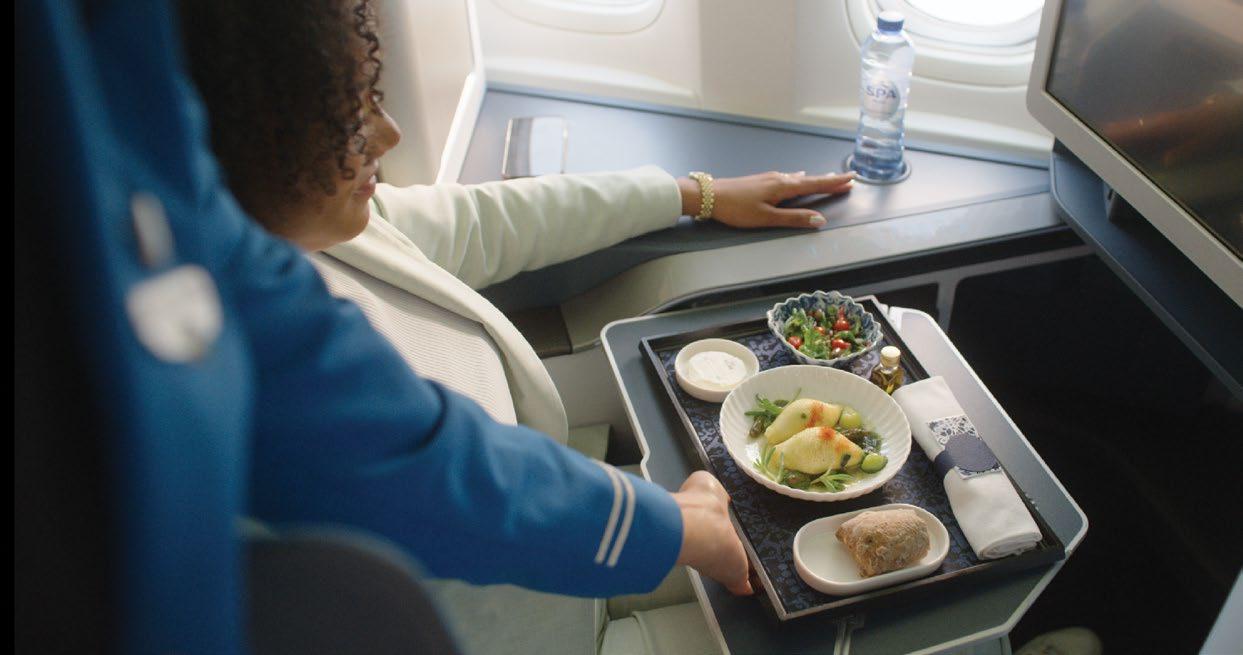
KLM Royal Dutch Airlines is wasting less food on board aircraft thanks to artificial intelligence. AI programmes enable the company to better predict how many passengers will board their flight. This allows the exact number of required meals to be calculated and KLM achieves up to 63 percent less food waste based on the expected number of passengers per flight. On an annual basis, this amounts to a saving of more than 100,000kg of meals.
“Investments in digital technology are a priority for KLM. The application of artificial intelligence contributes enormously to improving our flight operations and making them more sustainable.
Combatting food waste is a good example of this, resulting in tens of thousands [of] fewer meals being wasted on our flights each year,” says Marjan Rintel, CEO and President of KLM.
KLM is working on using artificial intelligence to determine the number of meals on board to help combat food waste. Not all bookings made result in a passenger on board a KLM aircraft. Depending on the class, between 3 and 5 percent of booked passengers do not show up (on time) for the flight.
The latest AI model (TRAYS) is the first model specifically developed for KLM’s catering activities. The AI model predicts the number of passengers on board based on historical data. The Meals on Board System (MOBS) receives the
expected passenger numbers per flight with separate forecasts for Business, Premium Comfort and Economy classes. The prediction using the AI model starts 17 days before departure and continues until 20 minutes before the flight departs.
able to make a valuable contribution to this important project for KLM. Our goal with Kickstart AI is to accelerate the adoption of AI in the Dutch business community, and we look forward to working closely with Dutch companies to
The largest improvement can be seen on intercontinental KLM flights from Schiphol, where 2.5 fewer meals (1.3kg) need to be thrown away per flight.
This means the most accurate possible number of passengers is predicted for the entire catering process from purchasing to loading, thus preventing a surplus of meals.
TRAYS was launched at the end of last year by Kickstart AI. The initiative assembled talent from leading companies, including KLM, Bol, Ahold Delhaize, NS and ING to work on the development of this model.
“We are pleased that we have been
make this happen,” says Sander Stomph, CEO and co-founder of Kickstart AI.
A three-month analysis shows that 63 percent less food is wasted compared to catering for every booked passenger. The largest improvement can be seen on intercontinental KLM flights from Schiphol, where 2.5 fewer meals (1.3kg) need to be thrown away per flight. On an annual basis, this amounts to a saving of 111,000kg in meals across all KLM flights that are catered from Schiphol.
17 March/April 2024 | www.africancleaningreview.co.za feature waste management

What greenwashing is and how to recognise it
According to McKinsey and Company’s 2021 Global Sentiment Survey, 51 percent of South Africans are willing to pay more for ‘purpose-driven’ brands. This includes businesses with a lower carbon footprint, better labour practices and supply chain transparency. As good as this news is for the planet, it leaves a lot of room for deceptive marketing.
Greenwashing is when companies publish misleading information about how sustainable their practices and products really are. They might do it intentionally (as a marketing ploy) or unintentionally by using buzzwords they don’t truly understand. In this article, the EPR Waste Association of South Africa (eWASA) sheds more light on how to recognise greenwashing as a consumer and avoid it as a business.
Unsubstantiated claims
In the age of misinformation, people are getting too comfortable with false news. Companies that say their products are ‘eco-friendly’ might never be questioned because there must be truth in it somewhere, right? The truth is that many of these claims are completely unfounded.
For example, a clothing brand may say it only works with factories that treat workers well. However, it never provides any evidence of fair compensation and working conditions. It becomes impossible to find any information about the supply chain. The company will never give its customers anything more than marketing to fuel their purchasing decisions.
Brand owners might vaguely mention what they’re doing about pollution on their website but won’t be willing to provide a sustainability report. A truly green business would have real data to back up its claims. It would be completely transparent about its practices because it has nothing to hide.
Vague marketing terms
The sustainability movement was built on buzzwords like zero-waste and carbon-neutral. These words make products seem trendy and green, swaying consumers toward them no matter the price. Brands want to use this type of language on their labels, sometimes a little too much. While a company can’t actually make false claims, it can use general terms that don’t mean much in the legal world. It might say a product is ‘pure and natural’, for example, to imply that it’s better for the planet. In reality, harvesting something from nature doesn’t automatically make it ecofriendly.
This misleading marketing tactic extends to images. Printing grassy fields on food labels, creating logos with leaves in them or even just using the colour green for no obvious reason could be a red flag.
Remember, just because something sounds green, doesn’t mean it is.
Jumping on green trends
“If everyone else jumped off a bridge, would you do it too?” – a question many parents use to teach children the value of independent thought. Now, we can use this lesson to sniff out greenwashing. In 2015, a video of a sea turtle with a plastic straw stuck in its nose went viral. Suddenly, plastic straws were out and paper ones were in.
Once people stopped liking paper straws, restaurants brought in bioplastics – straws made from plantbased materials like corn starch. This made the customers happy because the straws had the word ‘compostable’ on the packaging. What they didn’t know is that we don’t have commercial composting facilities in South Africa.
A study in the South African Journal of Science found that many businesses in SA only jumped on the straw trend to meet consumer expectations. This finding highlights a classic case of demand and supply. Uninformed consumers who demand ‘sustainable’ products without doing their research may inadvertently help businesses participate in greenwashing.

18 www.africancleaningreview.co.za | March/April 2024 feature waste management
Image by Freepik

This misleading marketing tactic extends to images.
Printing grassy fields on food labels, creating logos with leaves in them or even just using the colour green for no obvious reason could be a red flag.
Third-party eco-certifications in South Africa
Discerning between brands that care about the environment and those that don’t can be a challenging task. Good greenwashing is difficult to spot. Looking for endorsements from trusted third-party certification bodies is a good place to start. Below are some of the most prevalent eco-certification bodies in South Africa.
Forest Stewardship Council
The FSC promotes responsible forestry worldwide. Having this logo on your paper products or packaging proves that it comes from wood grown in sustainable forests that prevent deforestation and protect biodiversity.
Ecocert
feature waste management
soil quality and use water wisely. Seeing this logo on a clothing label means the fabric comes from a sustainable farm.
How EPR combats greenwashing
Ecocert provides environmental certifications for many classes of products worldwide. In South Africa, you may see this logo on certified organic food labels. It proves that food comes from farms that do not use chemical pesticides or treat animals unfairly.
The Rainforest Alliance
Often found on chocolate, coffee and other products from tropical regions, this label proves that the product does not contribute to social injustice or environmental destruction.
The Better Cotton Initiative
The BCI inspects and certifies cotton farms that pay workers fairly, protect
Extended producer responsibility (EPR) is about making producers more sensitive to the environmental effects their products have. South African EPR laws require businesses to reduce their packaging footprints through reducing, recycling and choosing recycled materials. Reporting is a big part of EPR, leaving no room for greenwashing.
Running an EPR-compliant business gives companies detailed insights into how green their products are. It makes transparency an everyday practice, helping brands build trust with their suppliers, partners and customers.
For more information about EPR and how to implement it in your business, visit: www.ewasa.org
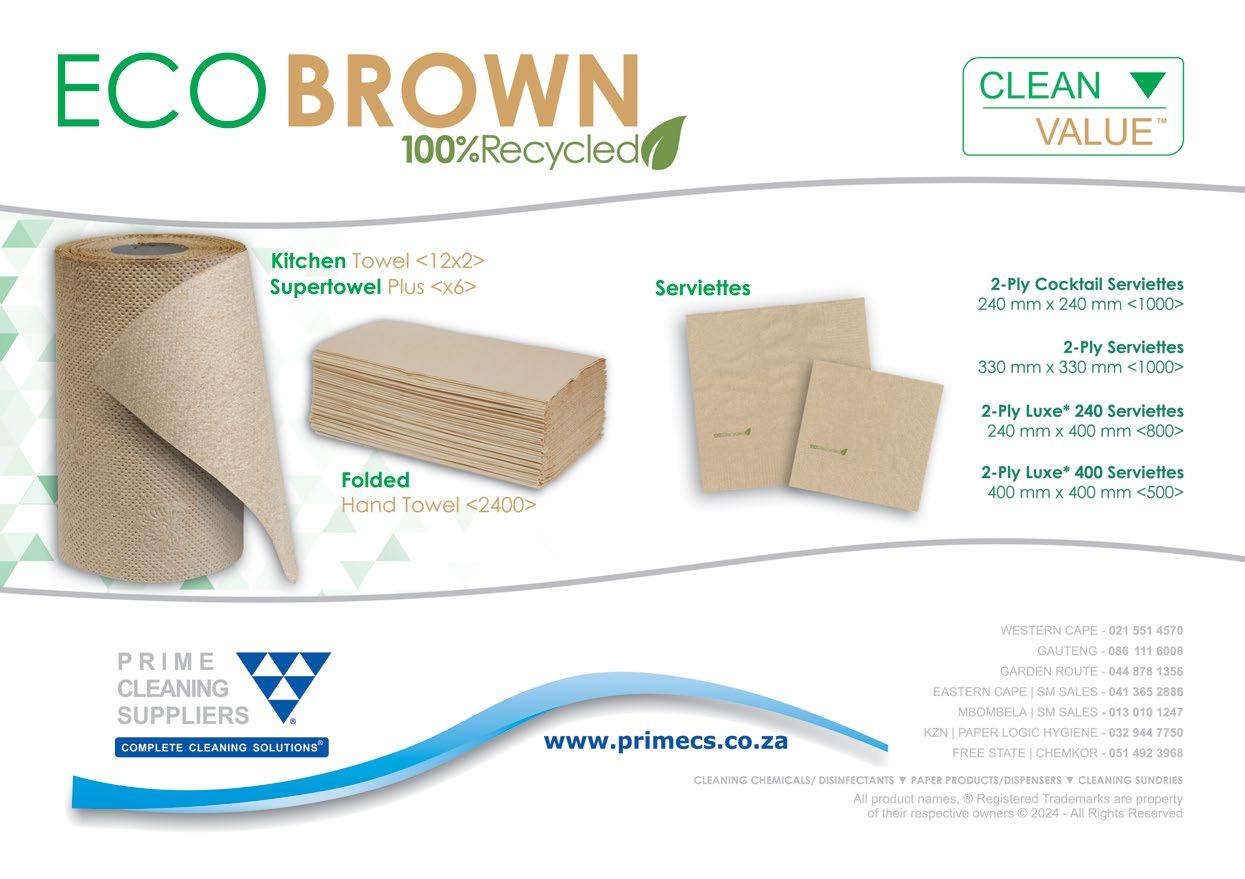
Professional Kitchens Need Cleaning
Products That Are Tough Yet Safe to Use
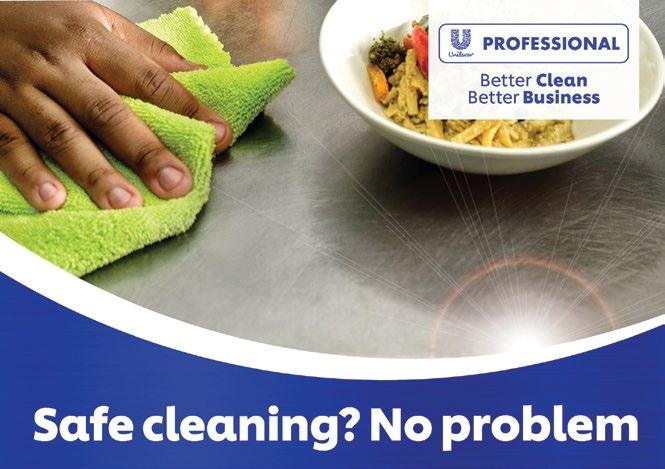
Unilever Professional has launched four products that operators can confidently rely on to keep their kitchen floors, surfaces, and equipment clean, disinfected and safe.
Harmful bacteria, grease, grime and soil can cause havoc in a professional kitchen. Cleaning and disinfection reduce the risk of food contamination and removes pathogens and debris which attract pests. But turning to harmful cleaning chemicals isn’t the answer.
Recent research shows that some chemical formulations can present risks when cleaning in the foodservice environment. This highlights the challenge faced by operators in the industry: Professional kitchens need cleaning products that are tough yet safe to use.
Chef Pinky Linah Maruping, who is a UFS Chef Experience Advisor and Co-Vice President of the SA Chef’s Association, points out that: “Cleaning with the correct products is so important and cleanliness is a must because effective cleaning is our first line of defence against viruses and infectious diseases. Cleaning products play an essential role in our daily lives. It is vital to use the correct products
for the right purpose to remove soils, contaminants and kill bacteria safely and effectively.”
Unilever Professional has launched four products that operators can confidently rely on to keep their kitchen floors, surfaces and equipment clean, disinfected and safe.
The Importance of Using Food-Safe Products in the Kitchen
Cleaning products used on surfaces and equipment that could come into contact with food must be certified as ‘food safe’. During the cleaning process, some product residue could be left on surfaces and come into contact with food consumed. To keep surfaces clear of pathogens, they must be disinfected, but the cleaning product must be officially certified as ‘food safe’ to ensure that its residue will not cause harm.
In South Africa, SANS 1828:2017 Clause 4.1.4 covers cleaning chemicals for use in the food industry. All products in the range have been tested and certified
The NEW Unilever Professional Food Safe Range is the Solution
by an external laboratory, Intertek, a multinational assurance, inspection, product testing and certification company headquartered in London.
Additional tests conducted by the National Regulator for Compulsory Specifications (NRCS) in accordance with NRCS /8054 /211025/266, showed that Handy Andy Multi Surface Disinfectant and Cleaner effectively kills 99.9% of germs. The NRCS is a government entity which administers compulsory specifications and regulations to protect human health. It conducts laboratory tests and inspections and operates in sectors where consumers could be at risk.
Four Essentials: The Food Safe Range
All four products in the Unilever Professional Food Safe range have been independently tested and achieved SANS 1828:2017 Clause 4.1.4 compliance which covers cleaning chemicals for use in the food industry.
Handy Andy Professional Multipurpose Degreaser is formulated to quickly dissolve stubborn grease, dirt and oil splashes. Active ingredients include naturally-derived cleaning agents. The product is ready to use for a streak-free, high-shine result and is suitable for use on stove tops and surfaces where food is prepared, like kitchen counters.
Handy Andy Professional Multi Surface Disinfectant and Cleaner has been tested and is certified by the NRCS (NRCS/8054/211025/1266) to kill 99.9% of germs without bleach. Cleaning daily kitchen dirt and disinfecting at the same time, the product leaves surfaces safe and hygienic. The active ingredients are 100% naturally-derived cleaning agents.
20 www.africancleaningreview.co.za | March/April 2024
editorial Unilever Professional
A quick-drying formula makes the product convenient for frequent, safe, everyday use on surfaces where food is prepared and on taps, sinks and hobs.
Lifting baked-on dirt from ovens and grills is easy with Handy Andy Professional Oven and Grill Cleaner
This powerful degreasing formula removes stubborn grease and burnton food stains from inside the oven and on grills. It eliminates the need for time-consuming cleaning as it acts fast for improved efficiency. Certified as ‘food safe’, the product is safe for food preparation surfaces.
For kitchen floors, Handy Andy Professional Floor Degreaser and Cleaner is guaranteed to have floors clean and shiny in just 10 seconds. Floors bear the brunt of a busy kitchen, with foot traffic, grease spatters and inevitable food stains. This product contains a powerful grease and food stain removal formulation that removes difficult grease and helps to keep the kitchen slip-free.
All four products in the Food Safe range come in one fragrancefree variant. Fragrances contain allergens that cannot be used in food preparation areas. Fragrances can also change the smell and taste of the
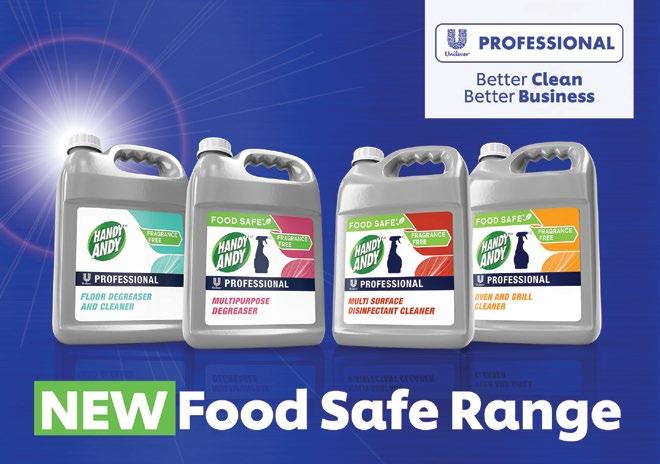
food. Why would you want to interfere with the aromas of bread baking, garlic roasting, bacon frying or a sizzling steak?
‘Green’ Credentials
Raw Material sourcing for Handy Andy is aligned with the Unilever Sustainable Living Plan (USLP) ambitions of eco-friendly/sustainable sourcing. No additional ingredients in the product are classified as hazardous to health or the environment.
With these four products, a small operator or cleaning service can maintain a Hazard Analysis Critical Control Points (HACPP) compliant cleaning system that keeps staff and customers productive, safe and satisfied.
With trusted brands used by millions of people worldwide, Unilever Professional means having peace of mind and results you can trust.
For more information, visit: www.unileverprofessional.co.za

21 March/April 2024 | www.africancleaningreview.co.za
editorial Unilever Professional
Nurture a workplace environment that prioritises employee well-being

Creating a workplace environment where employees feel valued, supported and appreciated fosters productivity, loyalty and overall job satisfaction, according to Marli Cilliers, Director at ERA Facilities Management. In this article, Cilliers shares practical tips for enhancing workplace ambience and showing appreciation to your corporate space, regardless of the calendar month.
Create comfortable workspaces
Consider the physical comfort of your employees by providing ergonomic furniture, adjustable lighting and temperature control options. Incorporating designated relaxation areas or green spaces where employees can recharge and find inspiration during their busy workdays can also be helpful.
Promote open communication
Create a culture of open communication and collaboration within your organisation, encouraging employee feedback regarding their workspace preferences and any concerns they may have. You will also find that actively listening to their input and implementing changes where feasible will also enhance their overall satisfaction.
Recognise and appreciate achievements
Everybody appreciates some recognition, so acknowledge the contributions and achievements of your employees regularly. Whether
through verbal praise, employee recognition programmes or small tokens of appreciation, expressing gratitude fosters a sense of belonging and motivates employees to continue striving for excellence.
Foster a sense of community
Nurture a sense of camaraderie and belonging among your team members. Organise team-building activities, social events and volunteer opportunities that encourage collaboration and strengthen relationships. Building a supportive and inclusive workplace community contributes to employee morale and overall job satisfaction.
Invest in cleanliness and hygiene
A clean and hygienic workplace is fundamental to employee well-being and productivity. Make cleanliness a priority by partnering with a reputable facilities management provider offering customised solutions tailored to the client’s needs.
You want to partner with a company that delivers outstanding services
with regular cleaning schedules, uses environmentally friendly products and invests in proper waste management solutions for a healthy and inviting work environment.
Cilliers says that nurturing a workplace environment that prioritises employee well-being and satisfaction is paramount for organisational success. “By investing in cleanliness, creating comfortable workspaces, promoting open communication, recognising achievements and fostering a sense of community, businesses can cultivate a culture of appreciation and positivity all year round. At ERA Facilities, our commitment extends beyond providing services – we believe in supporting organisations in fostering environments where employees thrive,” concludes Cilliers.
ERA Facilities is a B-BBEE enterprise predominantly owned by women, specialising in facility management services, particularly the softer aspects of facilities management, including integrated solutions.
22 www.africancleaningreview.co.za | March/April 2024 facilities management review
Put the customer and the planet at the centre of everything you do when cleaning
Companies that put the customer at the heart of everything they do will stand a much bigger chance of success in 2024. At the same time, we must remember our duty of care to the planet and the environment. Specialist cleaning services provider, Fidelity Cleaning Services, says this rings very true as well as when it comes to keeping any public facility or workspace clean and safe.
“We have noticed that our customers insist on a personalised service offering that meets their specific needs. They also want a cleaning service provider that matches their commitment to the environment. Most have already spent large sums on making their office buildings ‘green’, so it makes sense for them to choose an industrial cleaning company that is also environmentally aware,” says Malcolm Stephens, Divisional Executive for Fidelity Cleaning Services, a member of the Fidelity Services Group.
“Consumers expect companies to understand their unique needs and expectations. Consumers expect custom-made offers that treat clients as unique individuals. Due to this growing demand for personalised client experiences, meeting each client’s unique needs serves as one of the best ways to beat the competition.”

Stephens adds that consumers believe convenience to be more important than ever.
“Half or more of their purchase decisions are influenced by convenience. If you want your business to have longterm success, then you’ll need to provide clients with convenient solutions. In a challenging economy, clients are seeking the best value for the services acquired, which means offering premium quality services is a must.”
Due to a lack of industry knowledge and oversight, even well-established cleaning companies do not always use the best available chemicals, follow the proper cleaning procedures, follow safe work procedures or employ workers with the appropriate cleaning qualifications and experience. “This is why our cleaners had to go through more stringent screenings to ensure they are familiar with the cleaning procedures and have received the necessary training.”
According to Stephens, the business case for keeping your office workspace clean, is obvious.
“Providing a clean work environment helps in maintaining the well-being of employees. Cleanliness also reduces the chances of your employees getting sick. Bacteria thrive in office environments because people spend so much of the day there. To ensure worker safety, one
needs to prevent sick building syndrome. The sick building syndrome comprises various nonspecific symptoms that occur in the occupants of a building. This feeling of ill health increases sickness, and absenteeism, and causes a decrease in productivity.”
He recommends putting measures in place to prevent and control sick building syndrome, such as:
• Follow proper cleaning procedures with low VOC (volatile organic compounds) cleaning agents.
• Perform regular HVAC maintenance.
• Clean any wet areas and control building humidity levels.
• Install and maintain air filters.
• Choose low-VOC paint products.
As far as trends and expectations for the future are concerned, Stephens says robotics is a very big and exciting trend but, at the same time, a very expensive option for the local economy. Sustainability is also another very important trend that receives focus, for clients are increasingly demanding sustainable solutions.
“This includes information systems and data analytics, including electronic applications that can assist in decisionmaking going forward. Customers want smart tools that hold potential for cleaning businesses that reduce time in processes and that simplify operations,” he adds.
23 March/April 2024 | www.africancleaningreview.co.za editorial Fidelity Cleaning Services
Image by Freepik
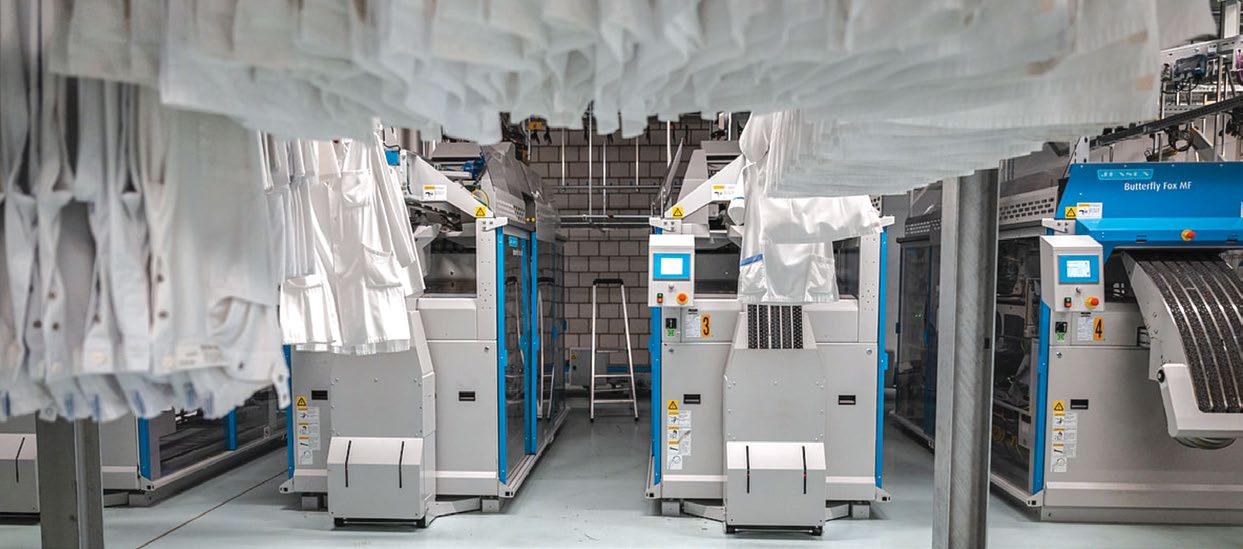
Workwear laundries: maximum clean with a low footprint
Workwear needs to be durable, comfortable and, most importantly, clean. From hospitals to the hospitality sector, from construction sites to firefighters, workers want to have comfortable clothes that fit them well. Depending on the industry, some textiles need to meet safety requirements, others have to be stylish. But most of all, professional workwear needs to be clean. From removing visible stains to safely dealing with hazardous contamination, the requirements for professional laundries are complex. Relying on a high degree of automation, combining modularity with ergonomics to sustainably process workwear and lowering water consumption are key principles to consider in workwear laundries, according to JENSEN laundry solutions.
Let robots do the dirty work
Any laundry process starts with soil sorting. Using an automated process minimises the need for human interaction when it comes to quality control and surveillance: you can literally let the robots do the dirty work – and thus keep your human workers safe from any related hazards. THOR, Inwatec’s robotic separator, picks up the garments from the conveyor belt, then hands them over to ODIN whose
ruthless X-ray scanners detect any unwanted object hidden in a pocket and makes sure the system rejects the associated garment.
If a garment is equipped with an RFID tag, it will be automatically detected and sent to the right processing stage. Even without RFID tags, automatic sorting is easy. By marrying AI and visual sorting, the system can process a huge amount of data and recognise most garments using visual criteria.
Automatic soil sorting not only keeps humans safe, it reduces damage to machinery and other garments caused by unwanted items making their way into the laundry process. Finding skilled employees has become a cumbersome task, which further highlights the importance of automation. Laundry managers will also be relieved to know that a soil sort system from Inwatec is fast to install and easy to maintain, with no special know-how required.
The correct washroom solution for every requirement
From different colours to a variety of textiles, the correct tunnel washer can handle it all – and keep water consumption low, even if there are frequent colour changes. When it comes to heavily soiled linen like uniforms or industrial workwear, the
JENSEN UniQ with its large drum volume is the perfect partner. With the laundry industry’s shortest transfer time of four seconds, the tunnel washer is suited to high mechanical action thanks to the unique drum design. The Archimedean helix offers a highly stable construction and removes soil using a washboard shape. Extra wash beaters provide even more cleaning action. JENSEN QuickSoak offers a very efficient and precise soaking effect: a simple extra shower for the linen in the first compartment for maximum soaking and drenching. This is particularly important for textiles that tend to float, like polyester or similar materials.
High-pressure cleaning nozzles remove residues of coloured and oily workwear before white articles are driven through the machine. This process prevents grey wash, prolongs the garment’s lifetime and increases comfort for the wearer. EcoTanks with large volumes enable separate water recovery by colour – and save the precious resource in the process. Warm water will be re-used for the main wash, and colder water makes its way to the pre-wash and rinse processes.
For optimum cleaning results, batches are completely separated in the pre-wash and main wash areas. Together with the FlexRinse
24 www.africancleaningreview.co.za | March/April 2024 textile care review
technology developed by JENSEN and an EcoTank system, a JENSEN UniQ tunnel washer combines high productivity with maximum flexibility and recovery of water and energy. EcoTanks with large volume buffers positioned next to the tunnel washer are fully integrated into the washing system. They are easy to clean, and their cleaning process can also be automated.
The finishing touches
The Metricon transportation and sorting system ensures a perfect flow of washed garments between the individual workstations on the one hand and more space on the other. It makes use of formerly unused space under the ceiling. The system regulates all movements of the garments and controls their sorting according to delivery tour, account, customer and wearer. The new JOS, JENSEN Operating System, equips Metricon with new, intuitive features, a fresh look and even more flexibility. Extensions and upgrades to existing systems are quick and easy. This makes Metricon the ideal solution for small and large garment laundries – with one software platform, one hardware system and one code.
MetriQ is the most ergonomic and productive loading station. Its unique buttons-to-the-front feature enables the efficient loading of garments with openings on the back side. All garments are loaded from the same side of the stations, no matter the type. This facilitates a mixed production of uniforms, scrubs and patient gowns, without time loss when moving to the opposite side. The built-in hanger collapse and hanger turner are efficiency boosters; the ideal ergonomic loading height can be set for each operator, which will reduce work-related health issues.
On top of all this, the new design of MetriQ loading stations makes it thrifty on space: five MetriQ stations occupy the same space as four conventional loading stations. This reduces the footprint by 20 percent.
A pro-fashional finish
In the last stage of the laundry process, the energy-saving tunnel finisher, Omega Pro, considerably improves processing times thanks to the unique S-shape at the inlet and outlet zones. This results in a slow and gentle temperature rise in the inlet zone. After drying, the garments
are slowly cooled down to ambient temperature in the outlet zone, ensuring a ‘pro-fashional’ finish at low energy costs.
The Fox folder meets all requirements to perfectly fold heavy garments, microfibre textiles, overalls and bib overalls. It folds, sorts and stacks the complete garment range at a high speed. Then, it expedites the folded garment into the packaging area, where the last (but not least!) mile in laundry operation shows all its glory: Jenway conveyors maintain the quality of the finished goods all the way to the dispatch area, where the automated track-and-trace functionality secures accurate stock control.
Laundry automation has a quick return on investment. Instead of dealing with repetitive manual tasks, human operators can focus on their real strengths. By combining robotics, data processing and hightech machines, professional laundries create maximum hygiene, safety and productivity – and keep their environmental footprint low.
JENSEN offers smart and sustainable laundry solutions for every industry and requirement. For more information, visit: www.jensen-group.com
The power of a venturi-based laundry dosing system
Introducing LS100, the company’s latest laundry system that uses water pressure to control chemical dosing, effectively meaning no moving parts, less wear and tear and hundreds of thousands of doses before you even need to think about cartridge replacement. That is the power of venturi. For now, this single system doses up to 10 chemicals in as many as four washers, making it perfect for on-premises laundries of every size. It is modular too; therefore, you can easily add additional units as your laundry grows. Featuring an intuitive touchscreen display and ergonomic formula selector, the LS100 can be operated via the new SekoBlue app, which uses Bluetooth connectivity for remote dosing management and data on demand even in the absence of Wi-Fi connectivity.
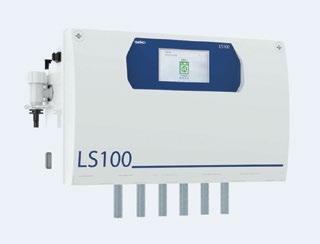

25 March/April 2024 | www.africancleaningreview.co.za textile care review
Numatic introduces next generation lithium power
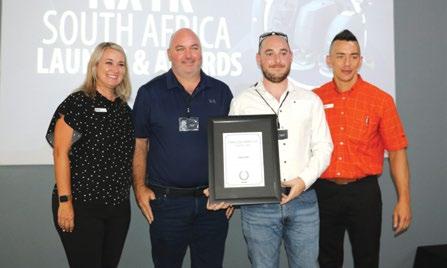
Numatic South Africa’s distributor awards ceremony and launch of the NX1K next-generation lithium power range took place at the company’s premises in Midrand, Johannesburg on 7 February 2024.
Numatic SA GM, Janine Botha, started proceedings with a thoughtprovoking talk on “You matter and how you help us make an impact.”
Botha engaged the audience with Numatic SA’s journey from a modest start in 1995 with only 15 employees.
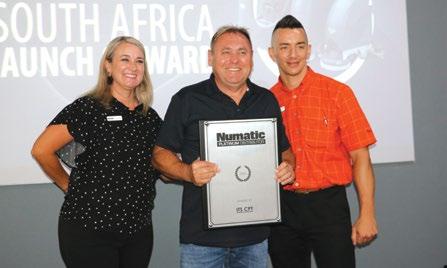
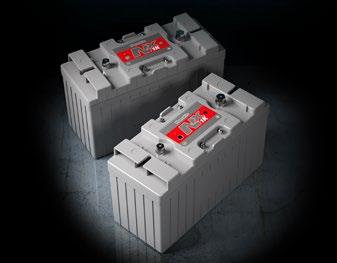
She emphasised the crucial role of distributors within the Numatic SA network, expressing gratitude for their contributions and acknowledging their impact on the company’s achievements. Her philosophy of embracing life’s challenges, known as ‘bitter-sweet,’ resonated with the audience.
As part of the proceedings, Numatic distributors were introduced to Numatic product experts including the Head of Technology, Matthew Coles, via direct video link from the head office in the

CASA Red Jacket golf day
The Cleaning Association of South Africa (CASA) held its first golf day for the year in Cape Town at the King David Mowbray Golf Club on 15 March. The day was hailed a success with many cleaning industry companies participating. As a novel incentive, CASA introduced the Red Jacket initiative whereby overall winners on the day received red jackets brandishing the CASA emblem on their pockets.
The first CASA Red Jacket winners were golfers representing ITS Kärcher Cape Town, who relished the opportunity to show off the new winners’ attire.

UK. Coles highlighted the benefits of investing in lithium technology compared to routinely replacing lead batteries. Utilising the latest lithium phosphate technology and delivering over 4,000 charge cycles, NX1K is one of the safest battery platforms on the market, according to Numatic.
The distributor event culminated with an awards ceremony where Janine Botha and JJ Smit awarded Numatic SA’s bestperforming distributors with Platinum and Sales Excellence awards.
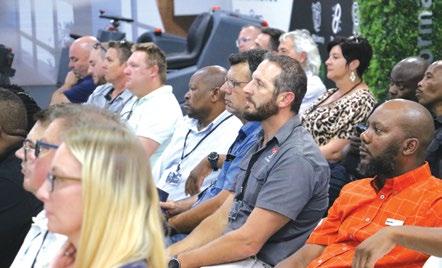


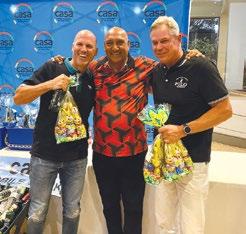

26 www.africancleaningreview.co.za | March/April 2024 people and events
Innovative products unveiled at exclusive showcase event
Prime Cleaning Suppliers (PCS) presented its latest product line-up at a spectacular showcase event held at Cape Town’s Marriot Crystal Towers hotel. New products and innovations were introduced to clients, complementing PCS’s already extensive range of premier cleaning products. The showcase offered industry professionals and clients handson demonstrations of a new range of equipment, highlighting innovative features and efficiencies.
Some of the products unveiled at the showcase included Arcora Ecoblack recycled mop trolley systems, PU floor pads, a unique multi-tool belt and the versatile Scrub & Clean 2in1 microfibre cloth. Consumables included the Ecobrown 100 percent recycled paper, among a range of products including serviettes, folded paper and roller towel.
Recognising the vast potential in the janitorial and sanitation sector (Jansan), Prime Cleaning Suppliers now offers a broader spectrum of products specifically aimed at this sector’s needs. By partnering with international companies that offer innovation and sustainability, PCS continues to set the standard for excellence in the South African cleaning industry while it keeps the company at the forefront of industry transformation.
The company aims to continue providing a strong sustainability offering through the incorporation of ecofriendly, recycled and proven sustainable products into its portfolio.
Prime Cleaning Suppliers professional consultants are able to effectively and accurately determine cost-effective and appropriate solutions to the many industries it serves. For more information, visit: www.primecs.co.za


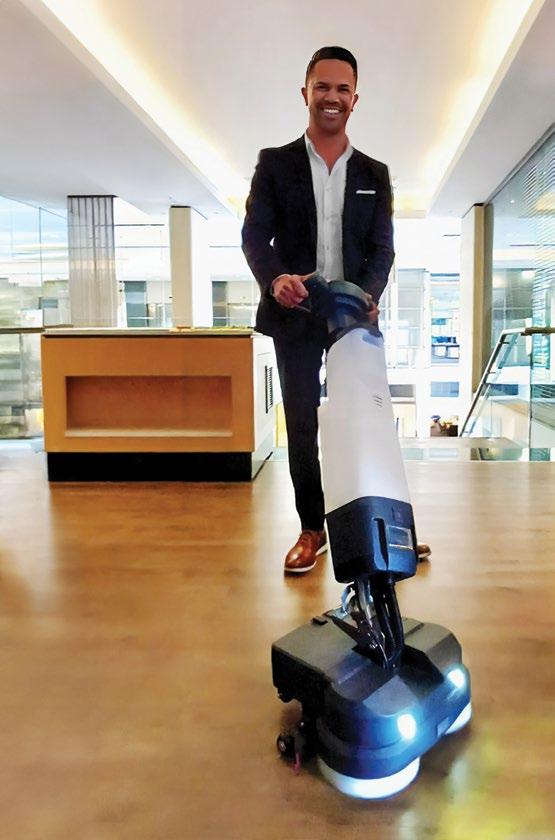

27 March/April 2024 | www.africancleaningreview.co.za people and events
products
Introducing the first 100% recycled, disposable microfibre wipe
Sustainable and effective cleaning has never been easier with the introduction of the new rMicrofibre™ wipe from Chicopee –the first 100 percent microfibre and 100 percent recycled disposable wipe, which is said to achieve 99.97 percent bacteria removal using just water.
Filling a crucial gap in the cleaning market with the increasing demand for sustainable wiping solutions and the surge in touchscreen technology in facilities, rMicrofibre is designed to provide maximum cleaning effectiveness in high-risk and high-traffic areas while supporting users in their sustainability goals. Designed for short-term use to reduce the risk of cross-contamination, the disposable rMicrofibre eliminates the need for laundering and the hygiene risks associated with reusable wipes, which cannot guarantee the removal of unseen bacteria after being washed.
Made with 100 percent recycled PIR and PCR fibres, rMicrofibre stands out as a pioneer in fully recycled microfibre disposable wipes, reducing the carbon
footprint of the wipe and giving a new life to recycled materials. Unlike alternatives in the market, which do not contain 100 percent recycled materials and lack pure microfibre, including blends with viscose that compromise performance, rMicrofibre remains unrivalled, ensuring sustainable and superior cleaning.
In line with Chicopee’s existing Microfibre range, the primary applications for rMicrofibre are in high touch points or in high-traffic areas prone to cross-contamination. This includes workspaces, healthcare facilities, airports, hotels and restaurants, targeting surfaces such as door handles, touchscreens, monitors, glass and stainless steel.
The fibres in rMicrofibre act as a magnetic force, trapping and removing bacteria in the damp cloth, which is certified to remove 99.97 percent of bacteria with just water, but can also be paired with chemicals depending on the user’s preferred cleaning regime.
By splitting the fibres into ‘micro’ fibres that are >80 percent finer than reusable

microfibre, rMicrofibre achieves superior surface contact to mechanically remove bacteria and dirt that get trapped in the fibre. The positively charged nature of the fibres attracts bacteria, dirt and dust, which, being negatively charged, are drawn towards, and effectively retained by, the cloth.
The introduction of rMicrofibre follows Chicopee’s 200th anniversary, underscoring the company’s legacy in safeguarding people and maintaining cleanliness in diverse sectors, including healthcare, hygiene and food markets. For more information on rMicrofibre, visit: https://chicopee.com/eu/product/recycledmicrofibre-wipes
Innovative toilet paper aims to tackle sewerage crisis
Groundbreaking toilet paper product technology designed to combat germs and aid in cleaning South Africa’s sewerage network is set to revolutionise hygiene and infrastructure in South Africa.
Imagine a world where each trip to the bathroom contributes to solving a national infrastructure crisis. This scenario is closer to reality in South Africa, thanks to an inventive startup, VEZ Technology, co-founded by the visionary, Vanessa Snyman. VEZ Technology rolled out a unique toilet paper designed not only for personal hygiene but to combat germs and aid in cleaning the country’s beleaguered sewerage infrastructure, thereby offering a solution to the multi-billion rand challenge of repairing and unblocking sewerage networks.
South Africa’s sewerage system is in dire straits. Decades of underinvestment and neglect have led to widespread failures, with sewage spills contaminating water sources and posing severe public health risks. The cost of repairing this crumbling infrastructure runs into billions, a daunting figure that underscores the magnitude of the challenge. Yet, amidst this gloomy backdrop, VEZ Technology aims to instil hope with its groundbreaking toilet paper. By embedding germfighting properties into the product, the company aims to tackle the problem from within, helping to clean and maintain the integrity of the sewerage network.
The novel toilet paper is no ordinary washroom tissue.
Infused with a proprietary blend of microorganisms, each sheet is engineered to break down waste and fight pathogens, thereby reducing the burden on overtaxed sewer systems.
The implications of this invention extend beyond the immediate benefits of cleaner pipes and reduced sewage overflows. It’s about empowering individuals with the knowledge that their choices, even those as mundane as selecting a type of toilet paper, can have a significant impact on the world around them. This approach not only addresses the practical aspects of the sewerage crisis but also taps into a growing consciousness among consumers about their environmental footprint.
28 www.africancleaningreview.co.za | March/April 2024 new
